Travels with Dick and Karen
South Africa
Part 4
Animals and Mountains:
Addo to Kruger
via the Drakensbergs |
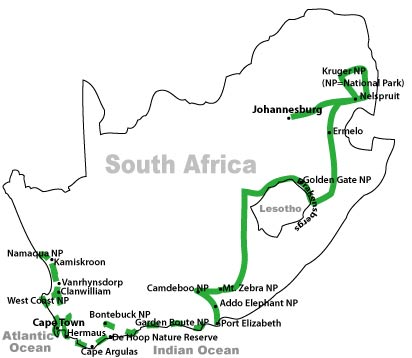 |
| Just north of Port Elizabeth is Addo Elephant Park which the guide books all raved about. Soon after entering the park we saw lots of evidence of elephants, such as these: |
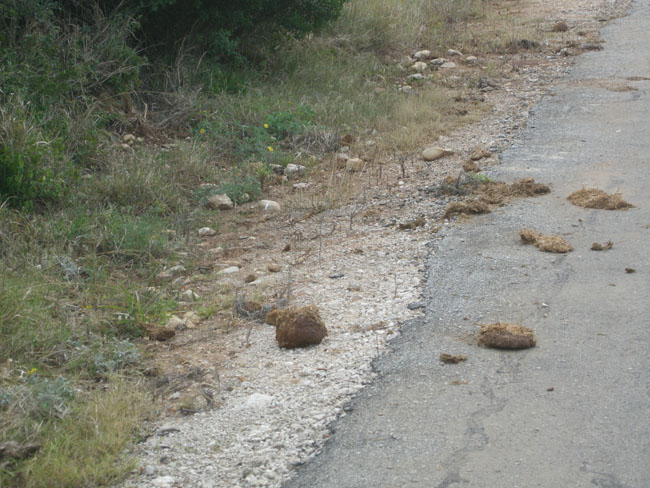 |
and this: |
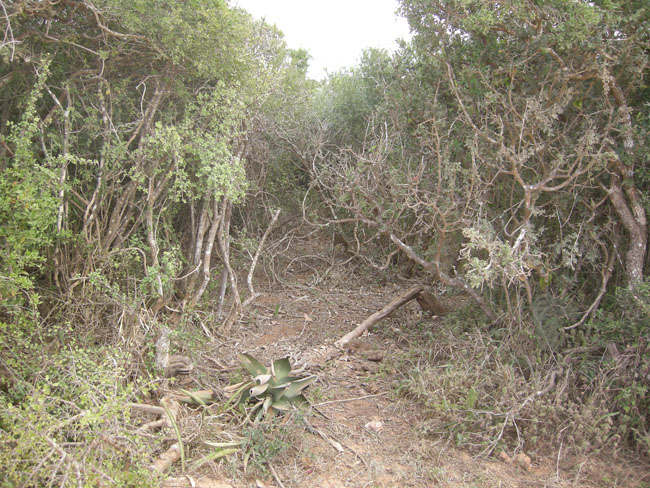 |
But the first few animals we saw were antelopes
(hmmm... narrow face with dark central blaze, spiral horns, no patterns on flanks... red hartebeest) |
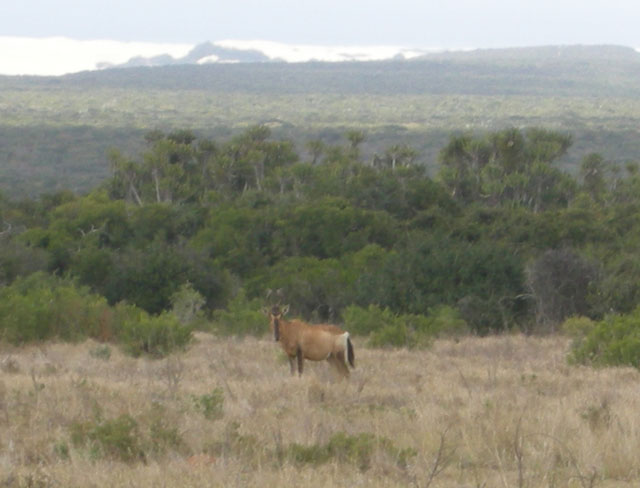 |
| and a (probably) black-headed heron. |
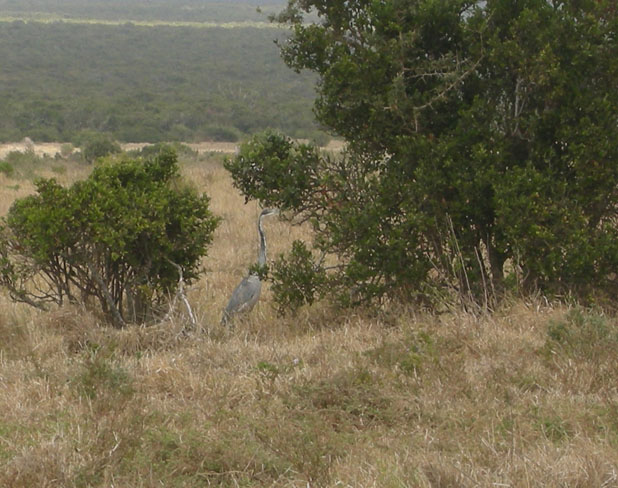 |
Then hurrah! We saw some elephants.
Yes, those are dunes in the background. |
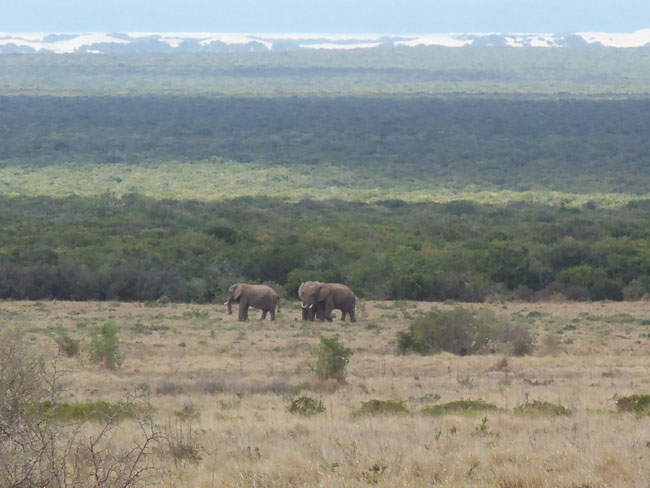 |
| And more antelopes |
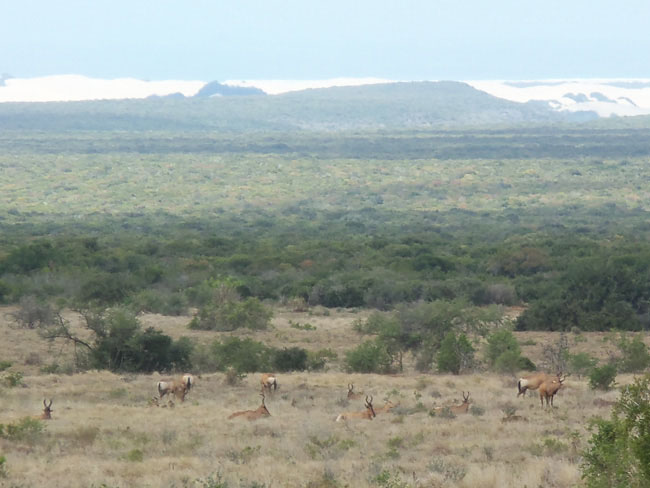 |
| And a few more elephants and several warthogs grazing. |
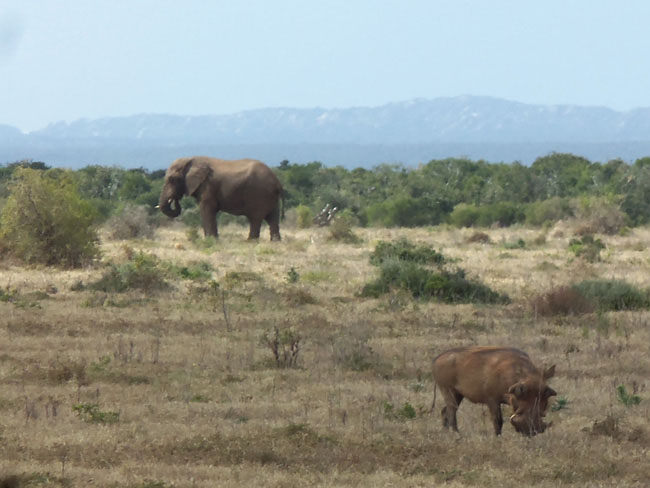 |
When a jackel showed up, the warthogs put their tails up and ran. |
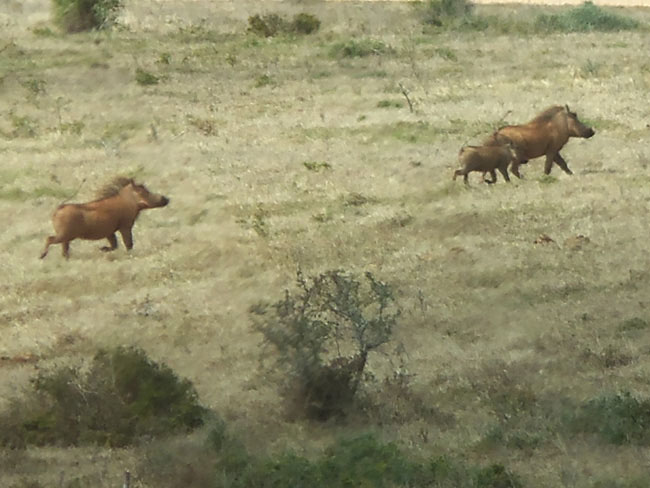 |
| |
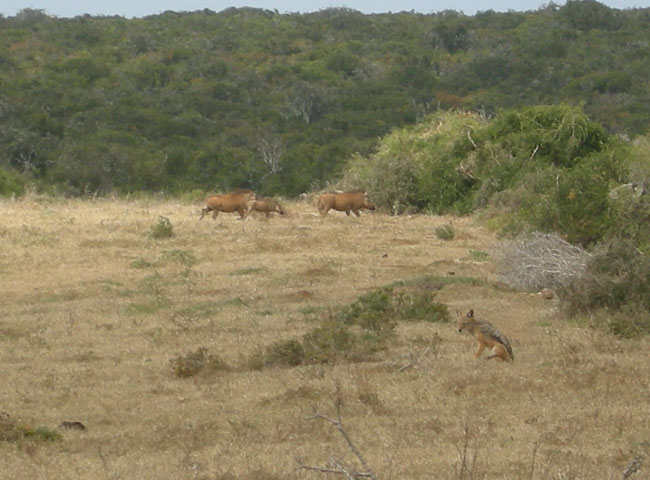 |
Animals seemed used to cars. Finding animals crossing the road was becoming a more frequent occurance. |
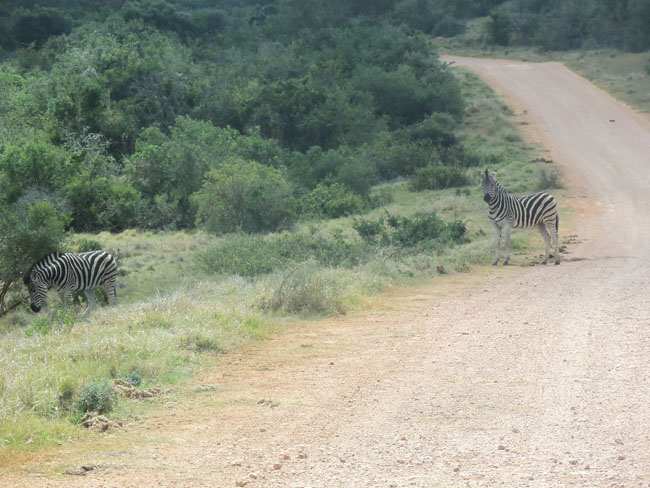 |
| They usually carried on normal behavior if we didn't stop too long. Here's how warthogs bend down to graze. |
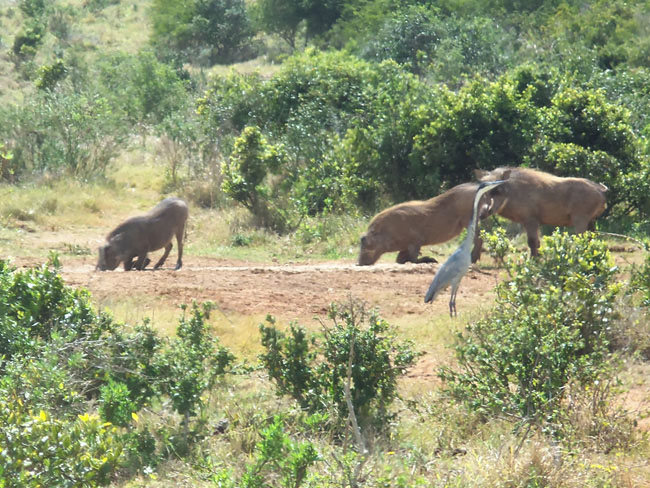 |
| But this tortise was moving out of the way as fast as he could. Really. |
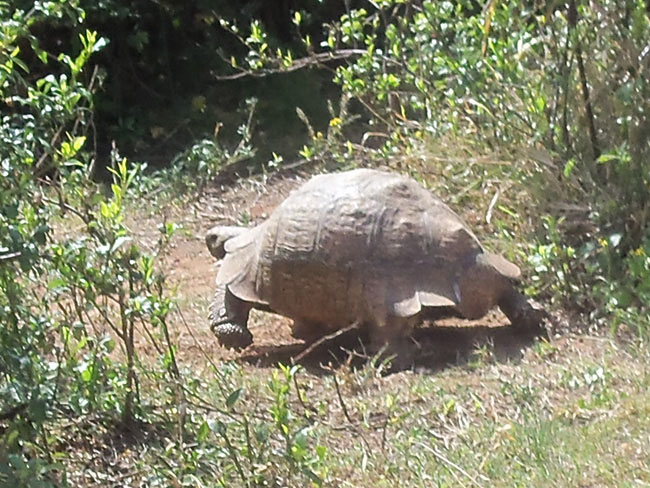 |
| Then we saw more elephants |
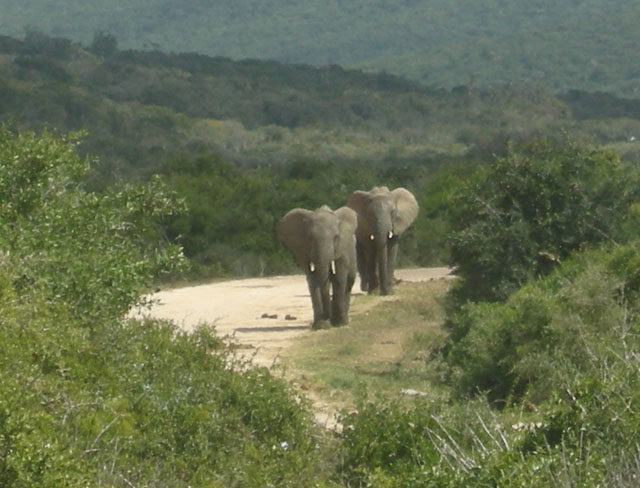 |
| And more elephants |
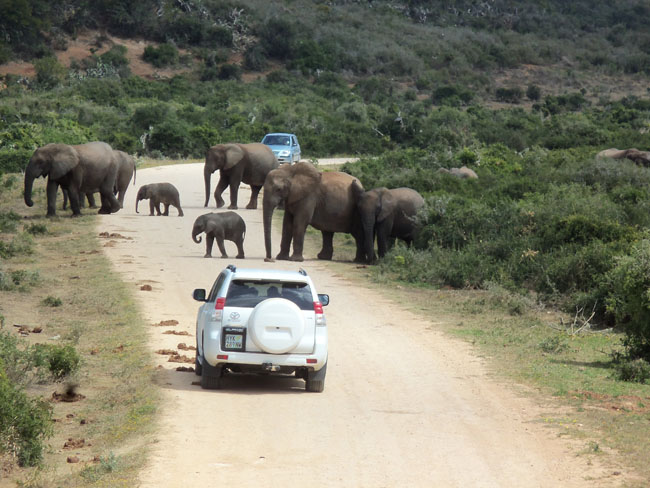 |
And more
... which lead to the question of "Do we wait for 100 elephants to all decide to cross the road, or do we weave our way carefully and non-aggressively through them?"(*)
(not for the first time, Karen wondered about the advisibility of having a red target, er, van)
(*): ex-Bostonian's answer: weave. |
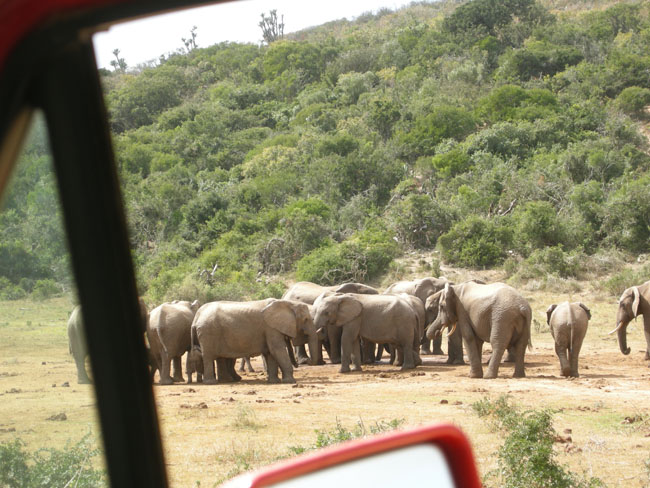 |
| And even more (note the warthogs in the front right) |
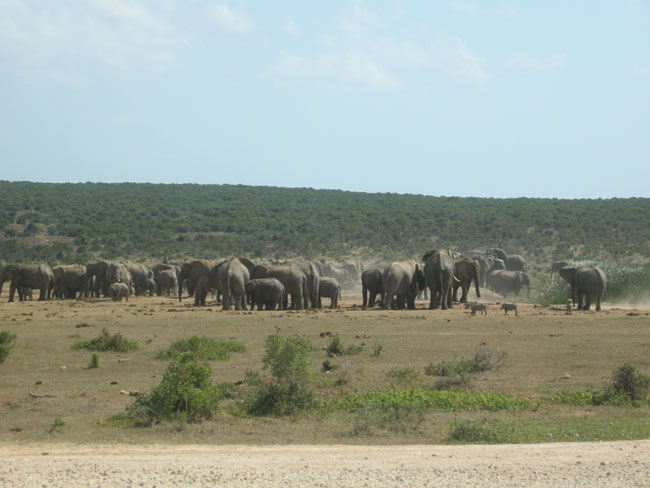 |
| Even elephant bathing! |
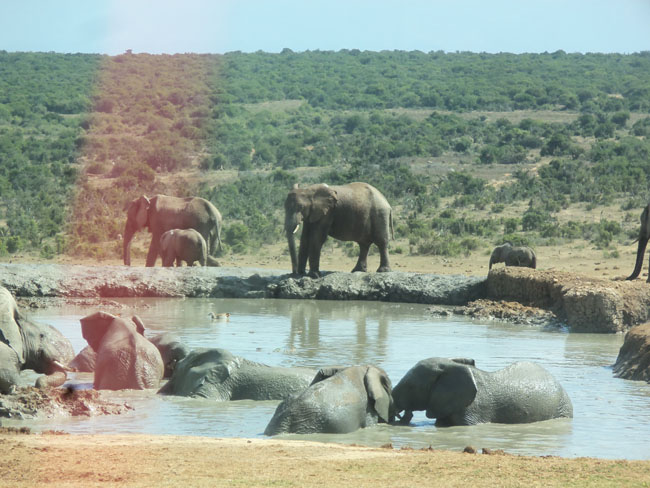 |
| Here's the vehicle people ride for the guided tours. You can also just drive around yourself during the day but cars aren't allowed on the roads after dark. So we took 2 night tours: one in Mountain Zebra National Park and one in Kruger National Park (stories below). |
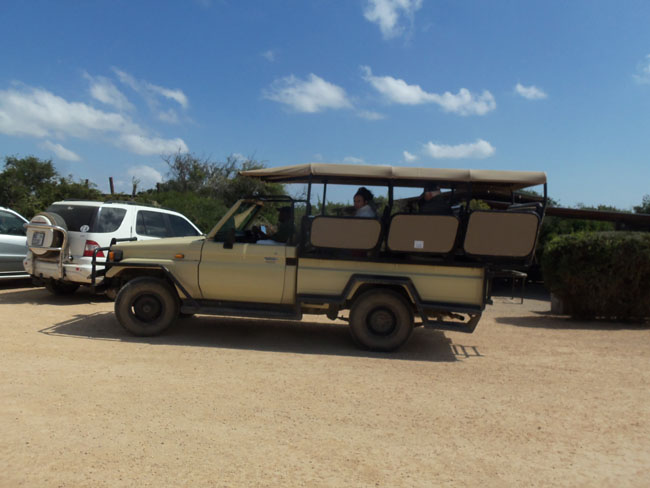 |
| A reminder of why you don't get out of your car. |
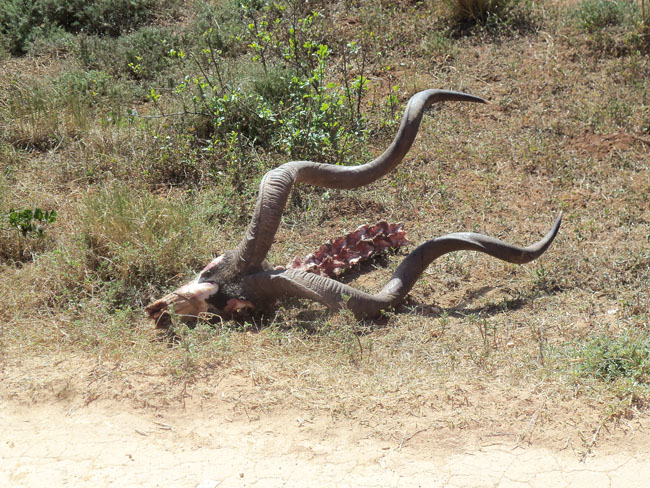 |
| Another tortise crosses the road |
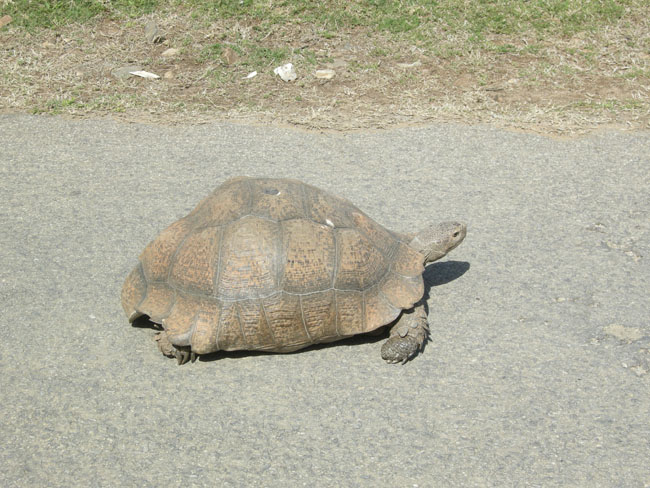 |
| Very different markings from the previous one we saw |
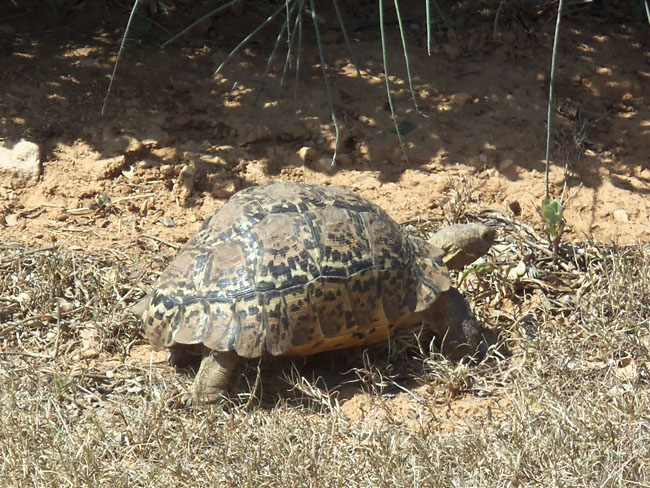 |
| And then a snake (probably a poisonous puff adder) crossed in front of us. |
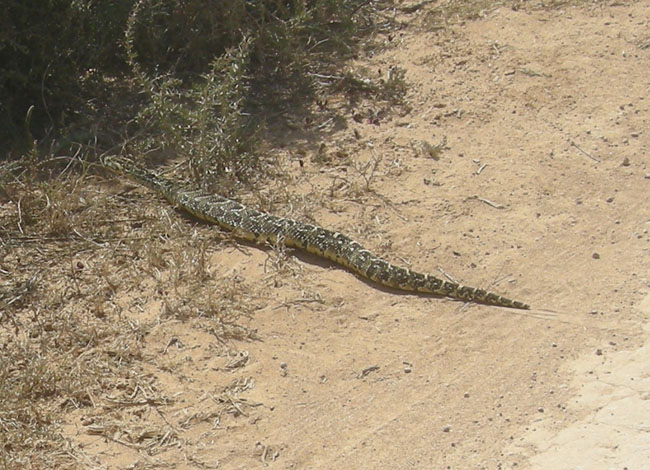 |
| Ibis always seem to come in pairs |
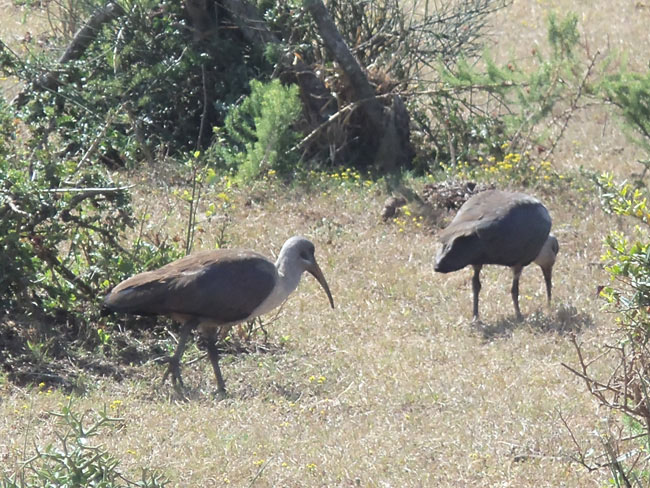 |
| A pale-chanting goshawk |
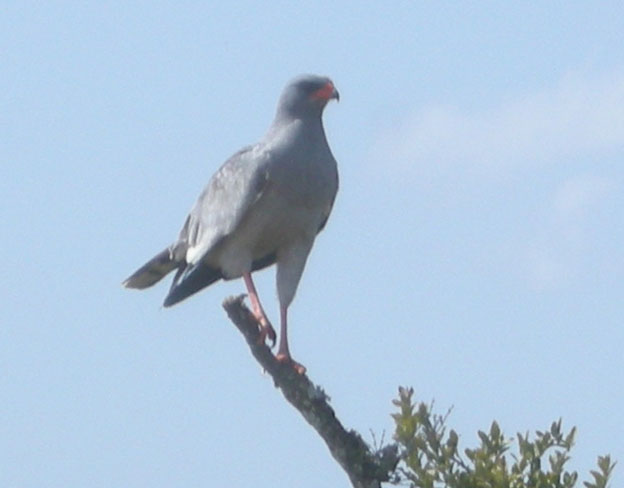 |
| Greater Kudu |
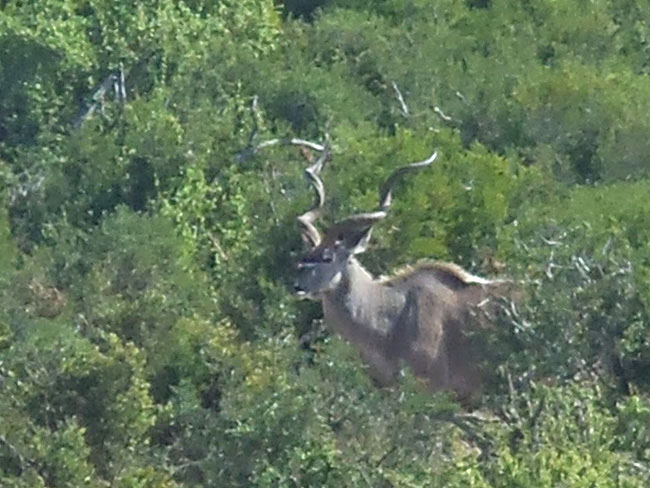 |
Even a display of thatching Karen's quite charmed by thatching... especially when it's on large buildings. |
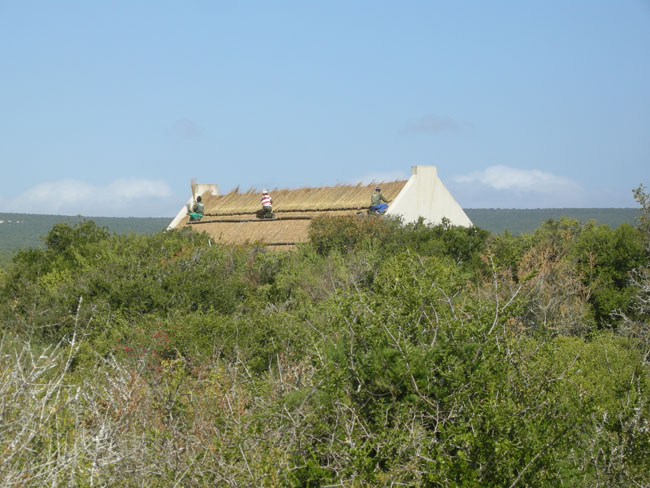 |
| Here's what it looks like when finished (and aged a bit). |
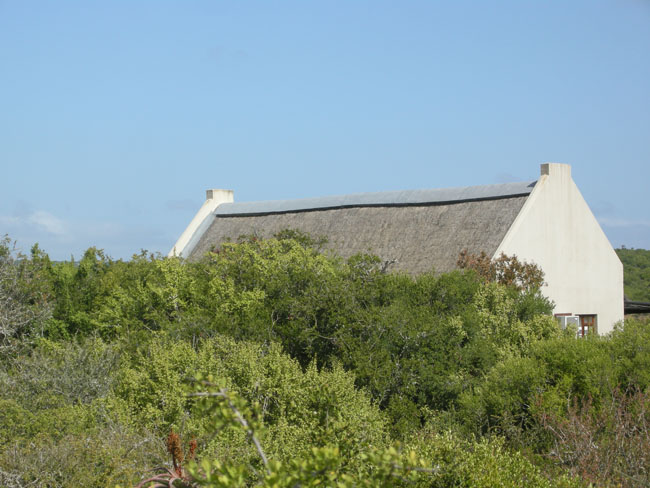 |
| Addo's visitor center had a very nice skull and horn display. |
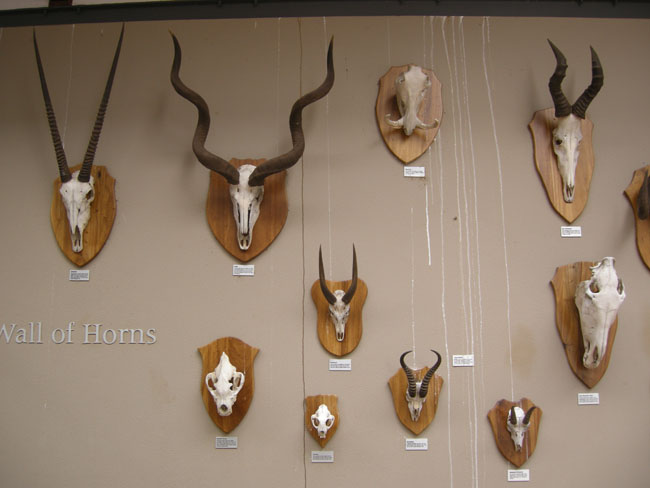 |
| But the rhino skull had been removed (note empty space with tag) |
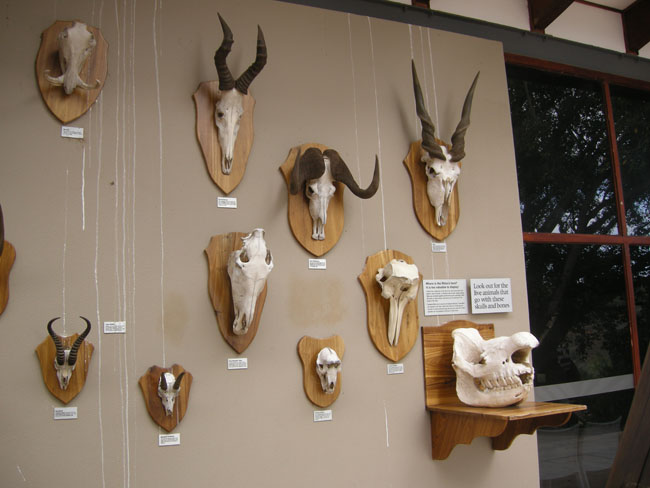 |
| The iridescent splendid starling makes me want to make an African glass table! |
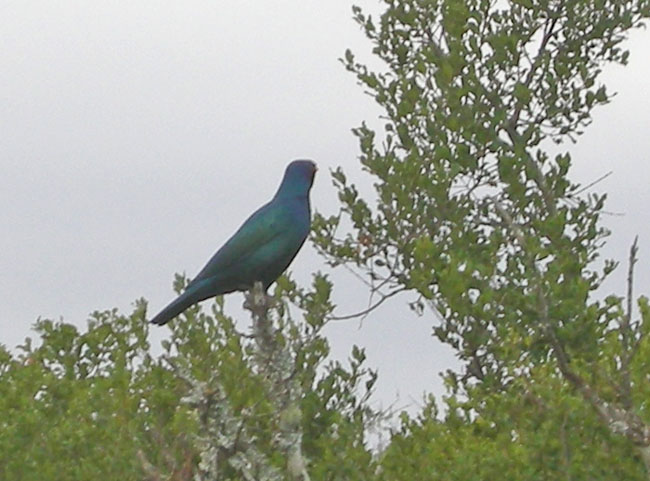 |
| And we finally were able to photograph the ever-present pied crow on the wing |
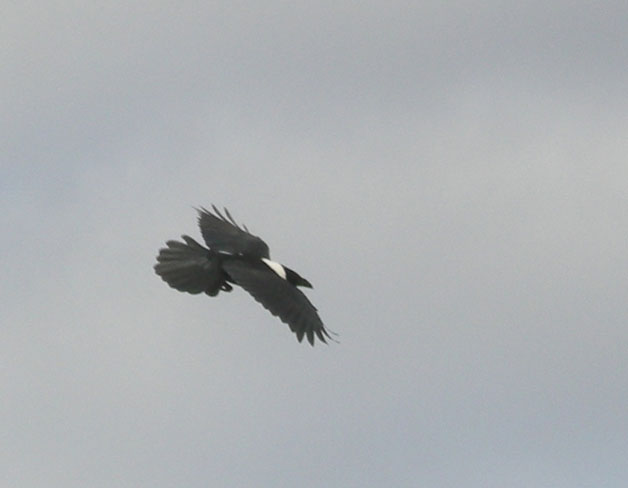 |
And one of the parking lot attendants (a Cape White-eye) |
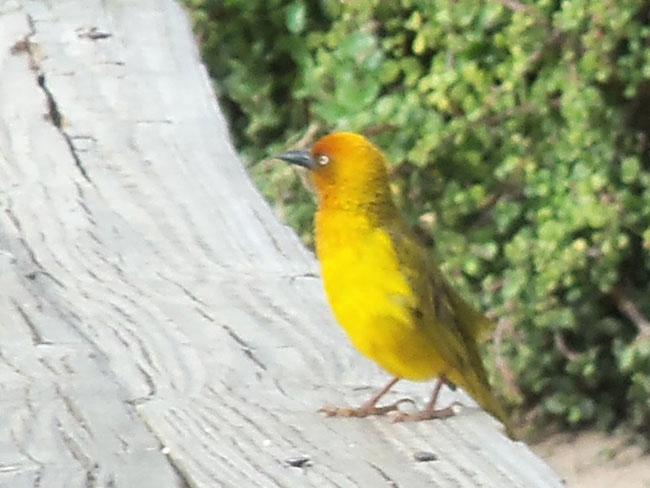 |
| lots of other birds as well |
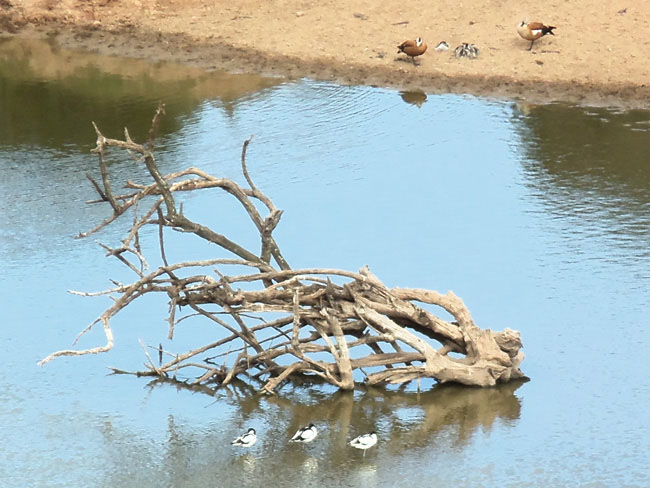 |
| and more |
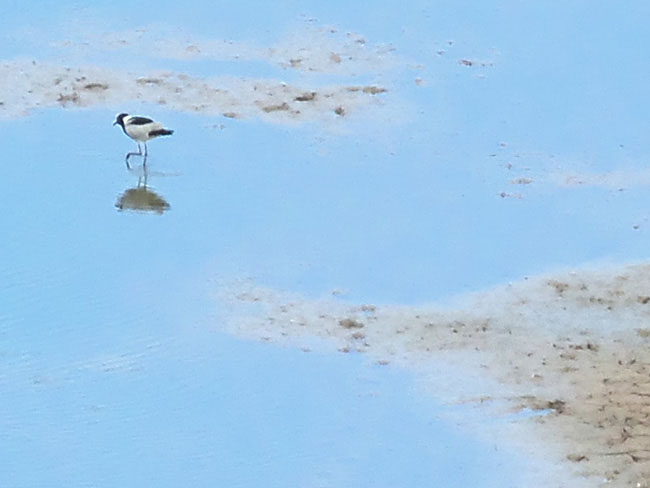 |
We decided not to get out.
The pieces of paper we were handed, or required to sign, as we entered the various parks all had a paragraph which boiled down to "We know we're entering an area full of dangers, and we won't sue the Parks Department if we're eaten or otherwise damaged." |
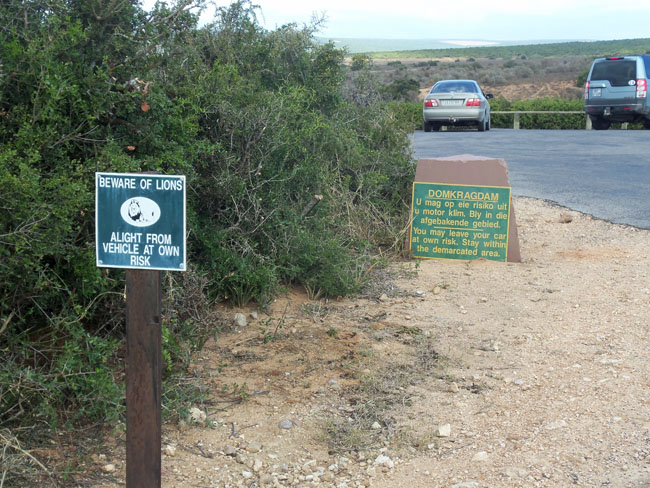 |
| Lots of raptors soaring-- this happened to land where we could get a picture |
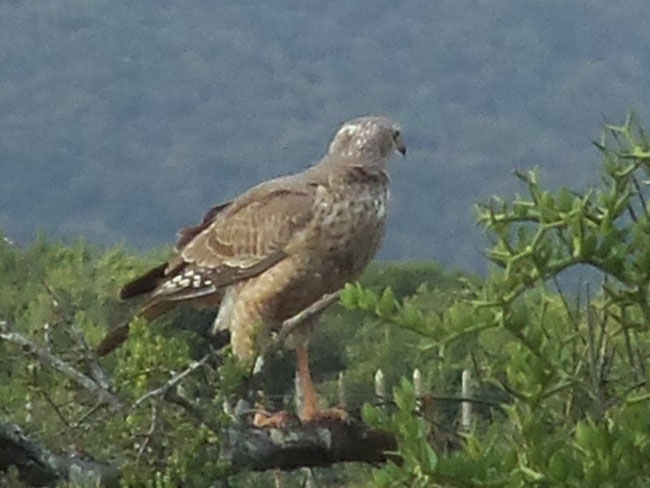 |
| Zebras travel in families |
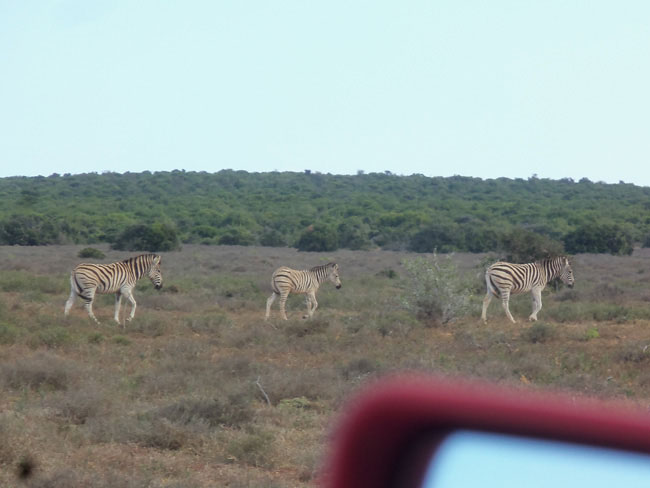 |
| As do warthogs |
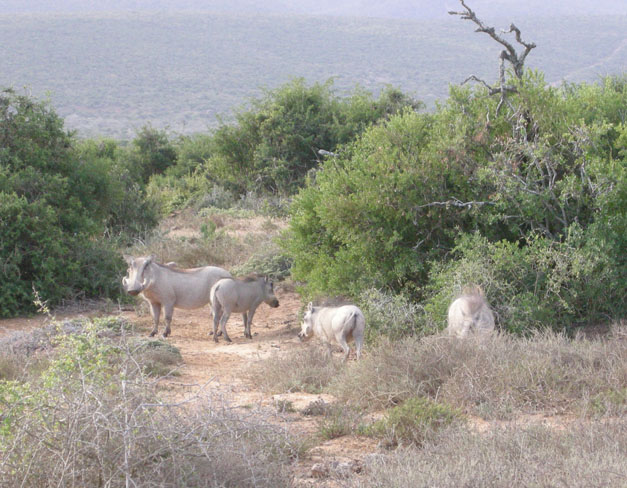 |
| Female greater kudu |
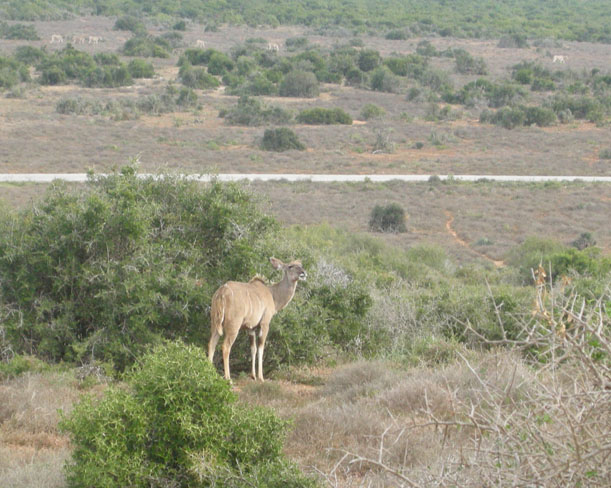 |
| The occational plant display had tags... |
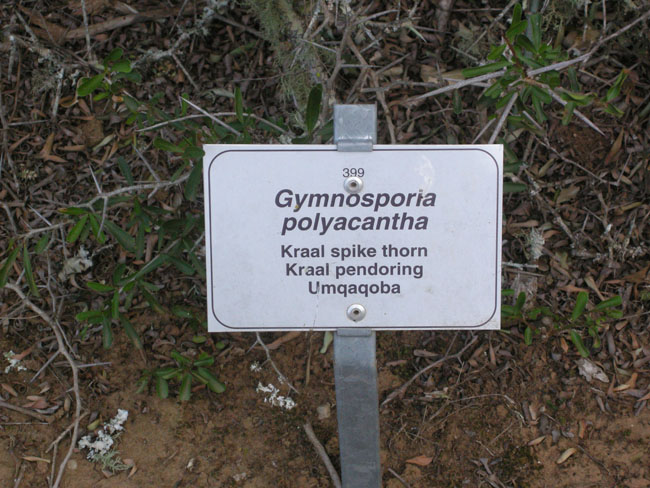 |
| This the plant the locals used to keep the lions out of their kraals (livestock pens) |
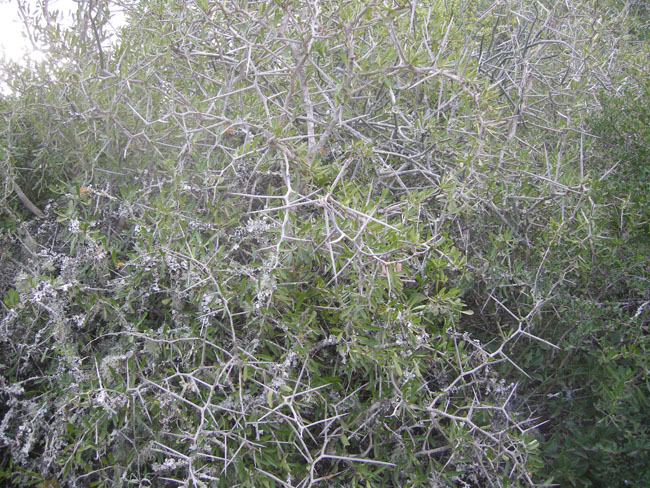 |
| The Addo Park camps were full, but we found a nice private camp just outside the park. The "Harvest Home Campground" was a fascinating mix of kitsch and ex-orchard (those really are avacado trees justifying the site's name). Bunny rabbits were hopping all over the place. |
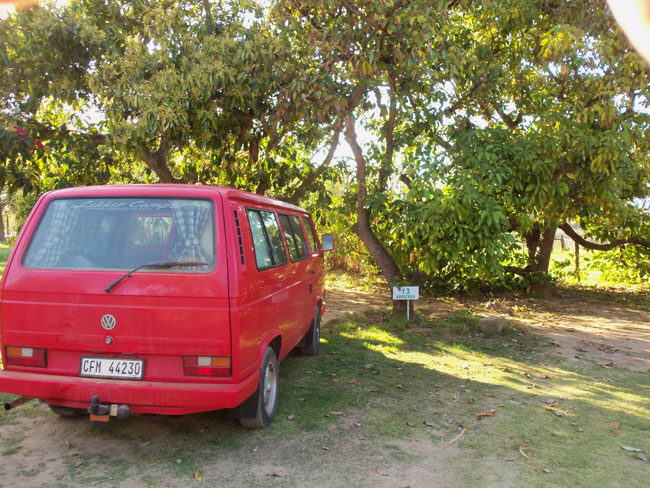 |
In the morning we headed further inland and northwest for Camdeboo National Park.
Let's see... two lanes, broad shoulders... yup, 120 kph (70 mph) posted limit. |
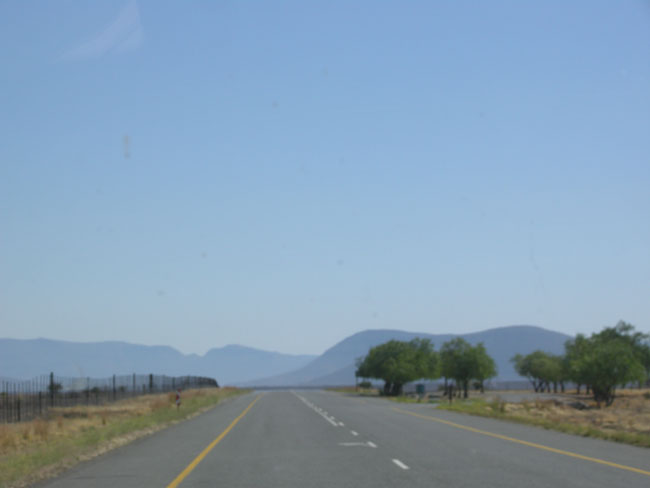 |
| The 3 parts of the Camdeboo park surround Graff-Reinet, a small town with a photogenic church at its heart. |
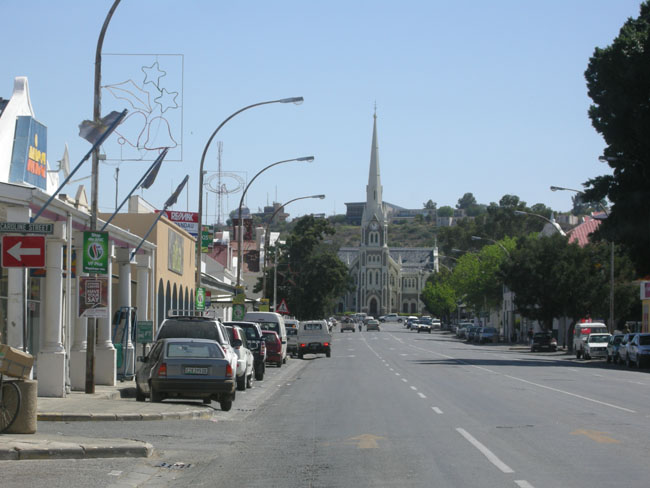 |
| Our first stop was the Valley of Desolation National Monument. |
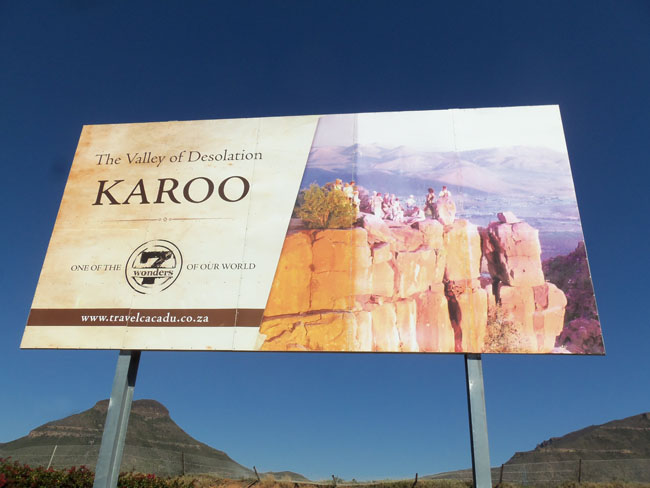 |
| A 2000-foot 1st gear climb in the VW brought us to this view back towards Graff-Reinet, which didn't look very desolate... |
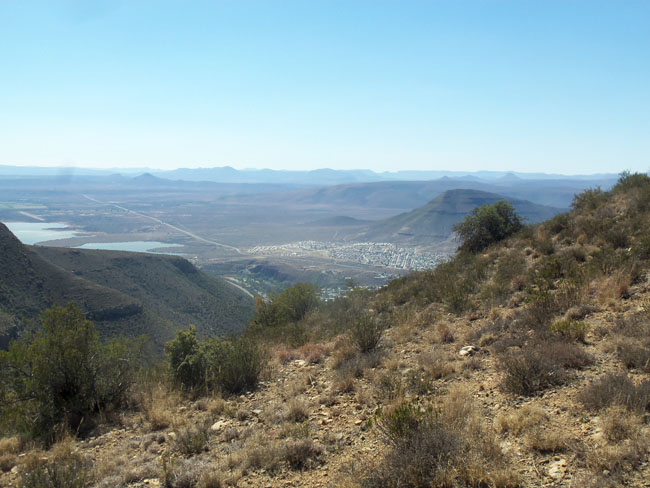 |
| ...then we turned around. |
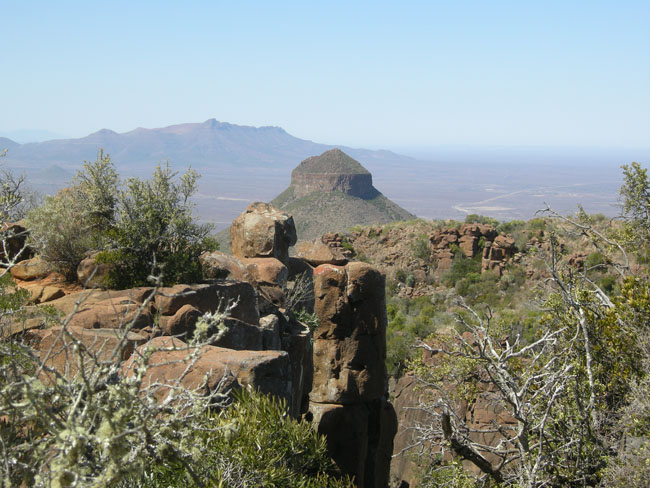 |
| Compare to the billboard shown earlier. |
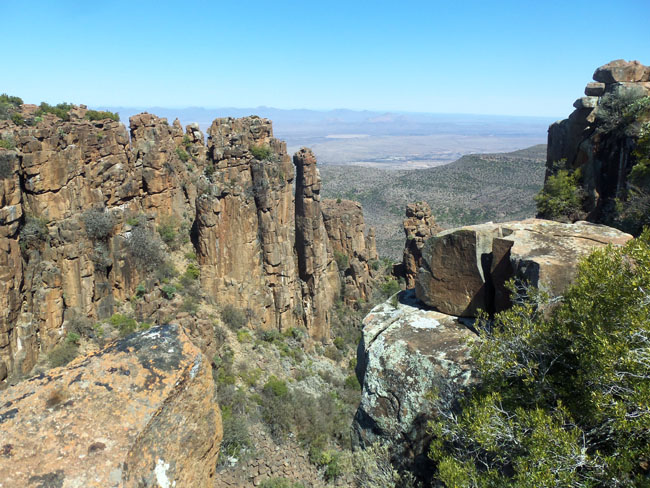 |
| Even here there were plants in bloom, mostly aloes and other succulents. |
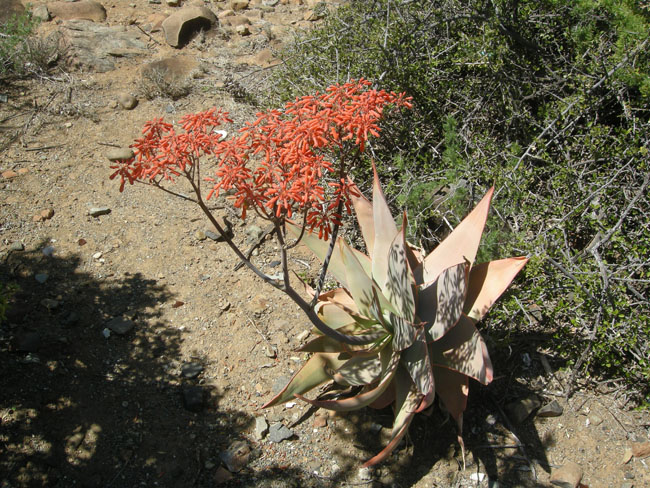 |
| Dropping back down to the highway, the second part of the park was the game viewing area spread out to the north and east of a man-made lake. |
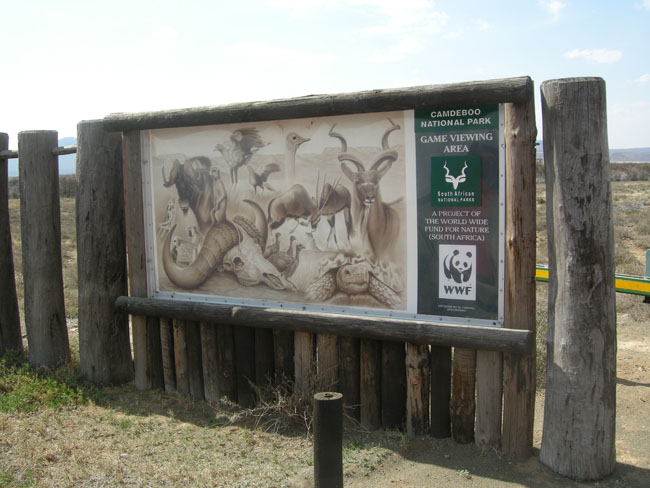 |
| But by this time it was hot mid-day and they were probably lying down in the shade. |
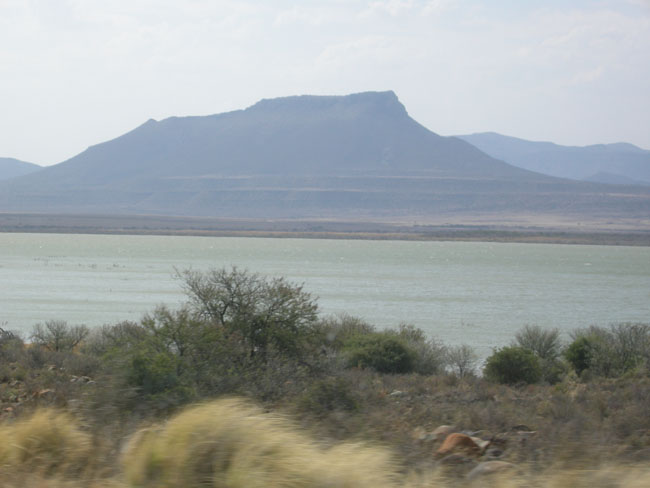 |
| Interesting landscapes |
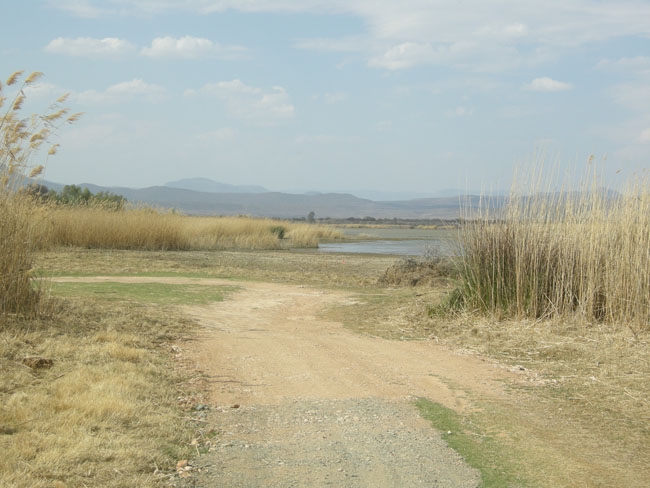 |
| but no animals |
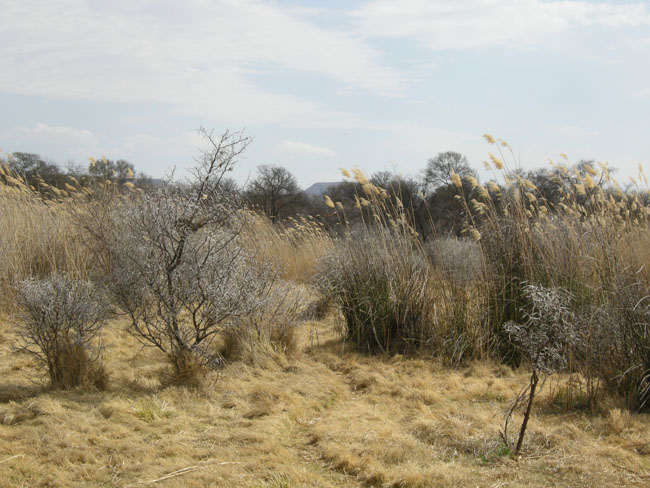 |
| Even in the heat of the afternoon, it was a fascinating exploration. |
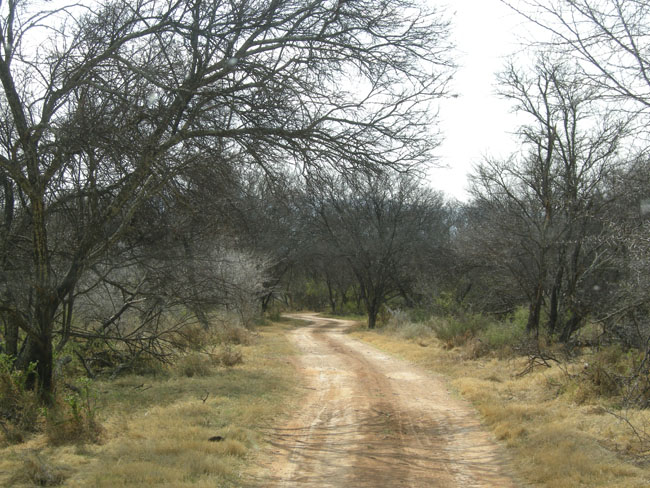 |
| We finally saw a few springboks |
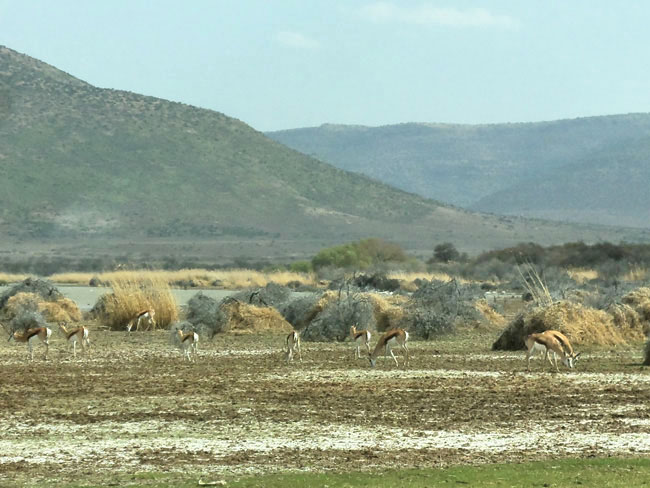 |
| and a few more, with thorns. |
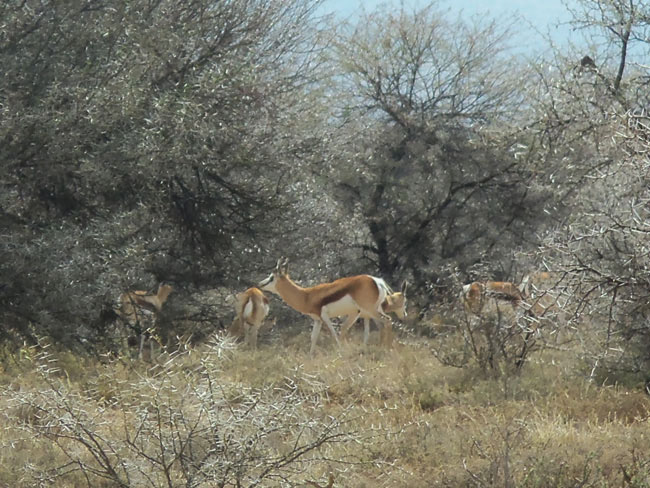 |
| and some vervet monkeys |
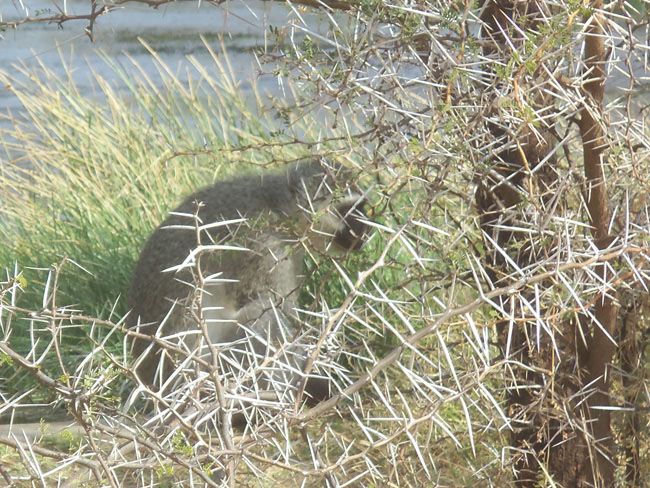 |
| We were searching for Cape Buffalo, but only found them on the roadsigns reminding us to be aware of our surroundings. The afore-mentioned fine print. |
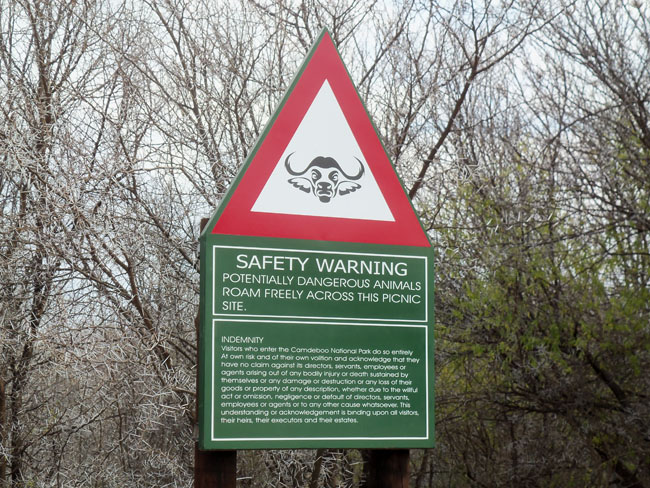 |
| Steenbok |
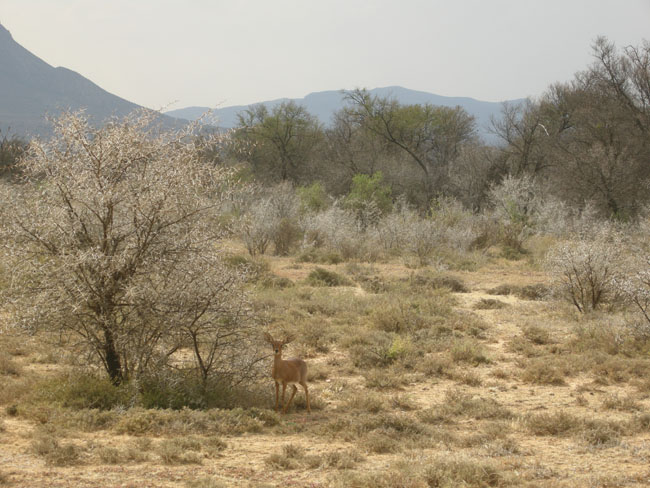 |
| Heron |
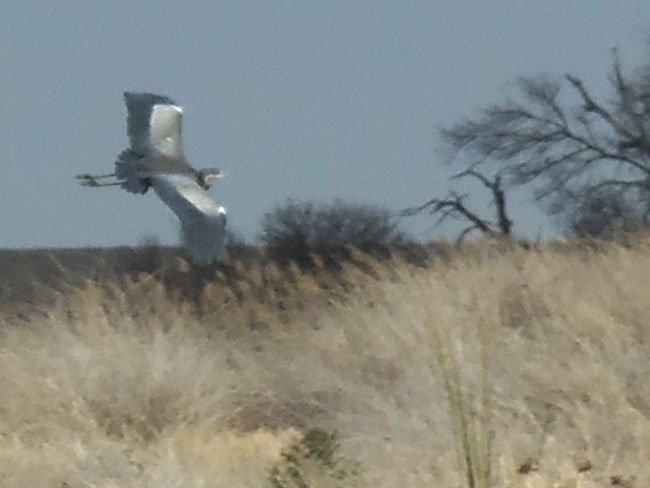 |
| Nesting ostrich. A guide said the males were usually on the nest at night so they were black and the females by day so they were brown. |
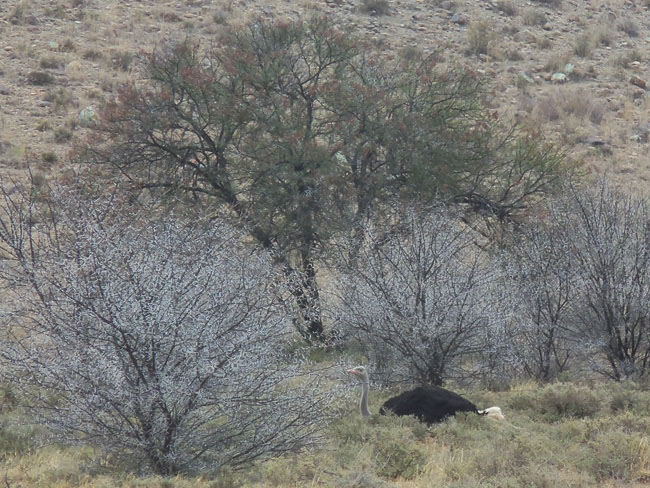 |
| Numerous footprints showed that animals had been here. |
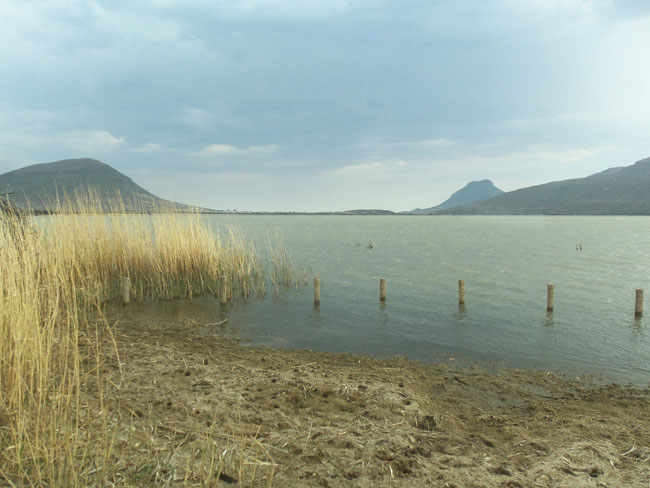 |
| This heron paraded nicely as we wondered what might be around us in the reeds that we couldn't see. |
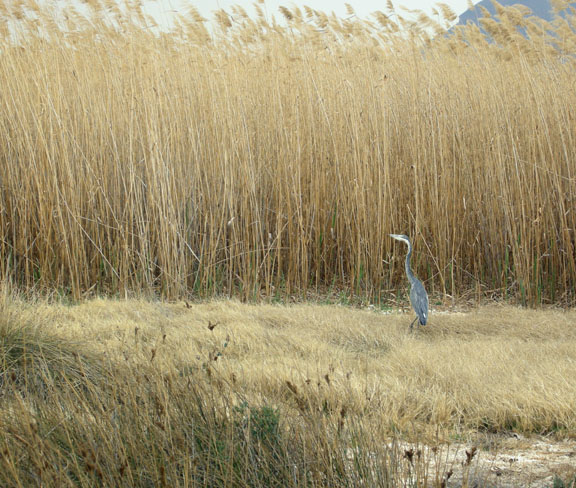 |
| As we got into into more open areas we found red hartebeests grazing and chewing their cud. |
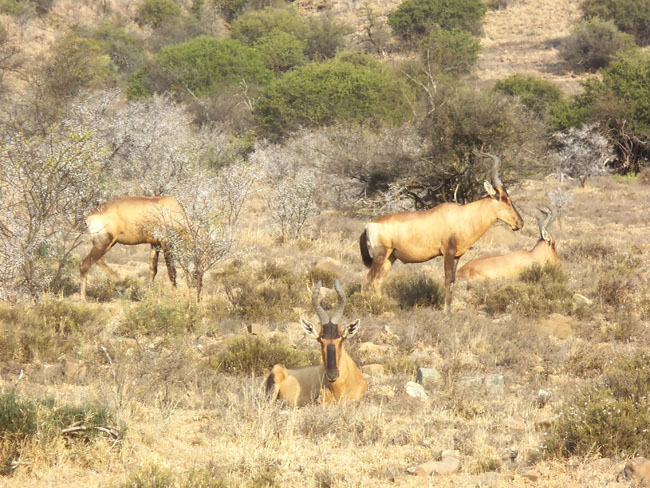 |
| Leaving Camdeboo and heading eastward, we saw these alien invaders (agave flower stalks) |
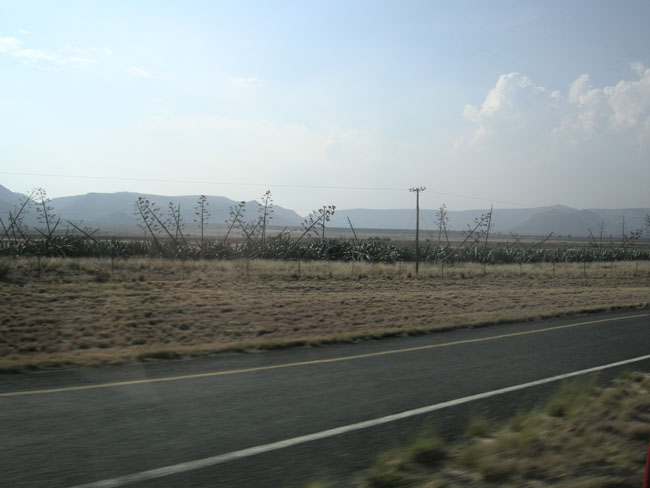 |
| Approaching the town of Cradock, we turned off the highway and drove into the Mountain Zebra National Park. Our campsite with its caged new trees. |
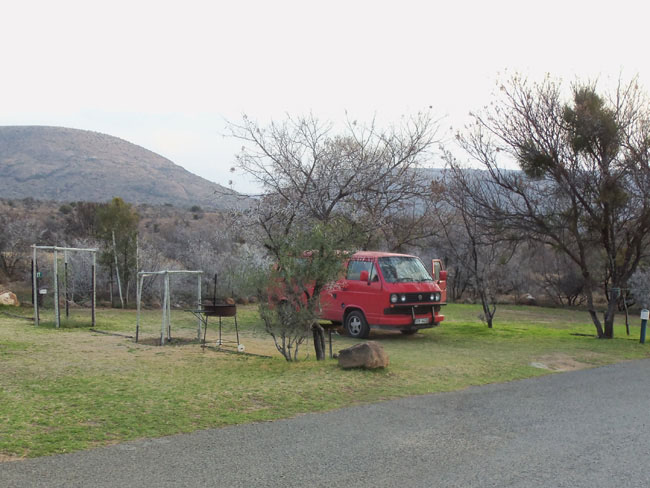 |
| That evening we took the opportunity to try a guided night drive through the Park -- none of the photos turned out well but we saw lots of small nocturnal animals (jackals, caracals, bat-eared foxes, duiker, bats). Dick was surprised by the number of antelope that were still up and moving around. They were so common that eventually the guide didn't even slow down as the guests spotted and called out "kudu" in bored voices. |
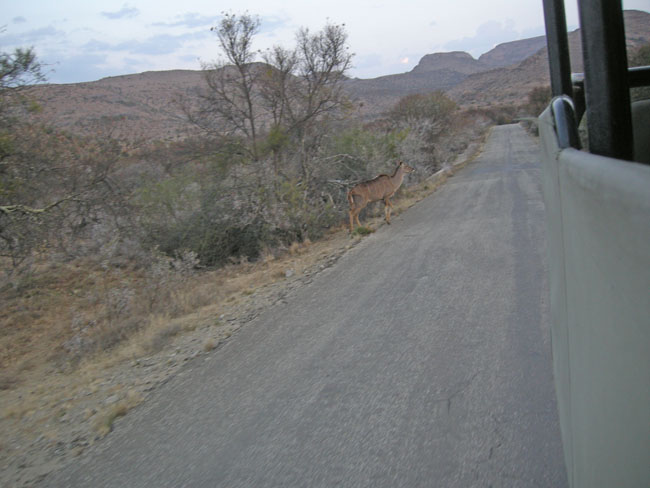 |
| In the morning, driving ourselves, we saw larger beasts. A hartebeest (perhaps the kudu were finally catching some shut-eye?) |
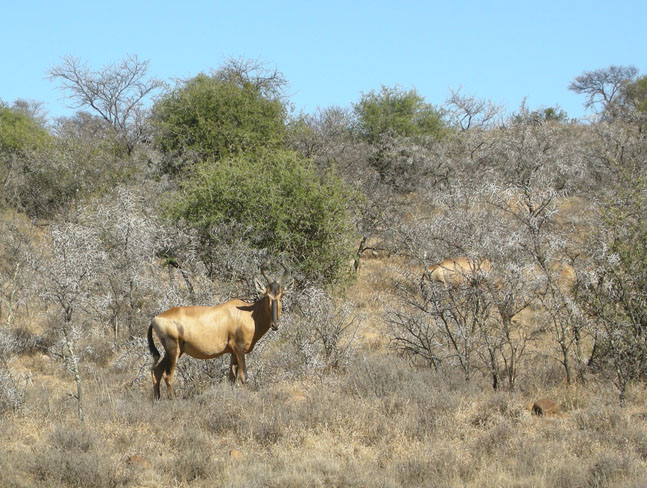 |
| And more |
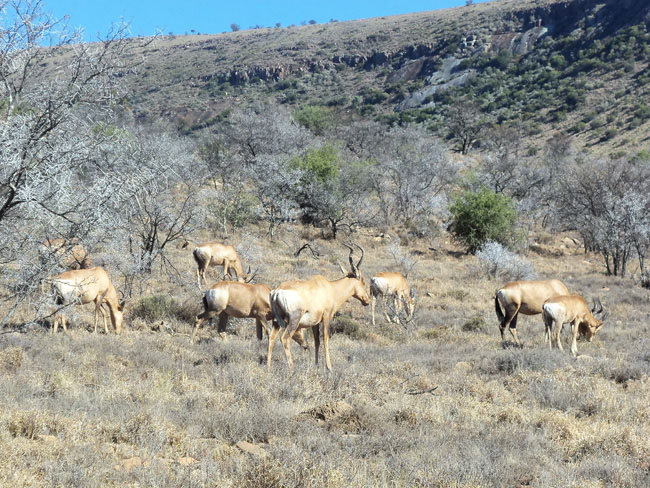 |
| and some two legged grazers |
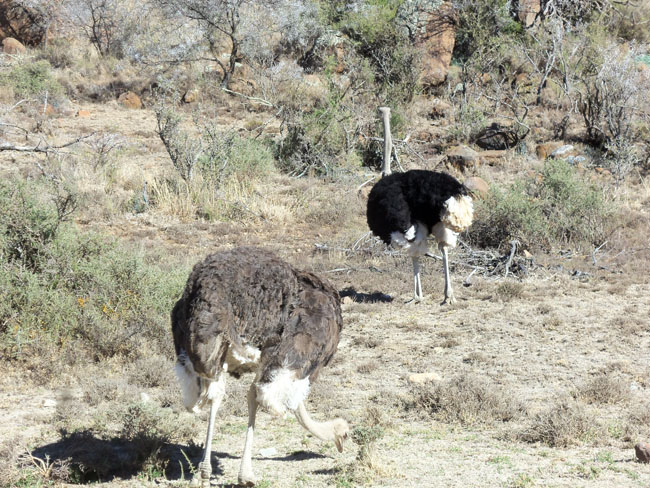 |
| After following a winding river, the path climbed tortuously 2300 feet to a high plateau. |
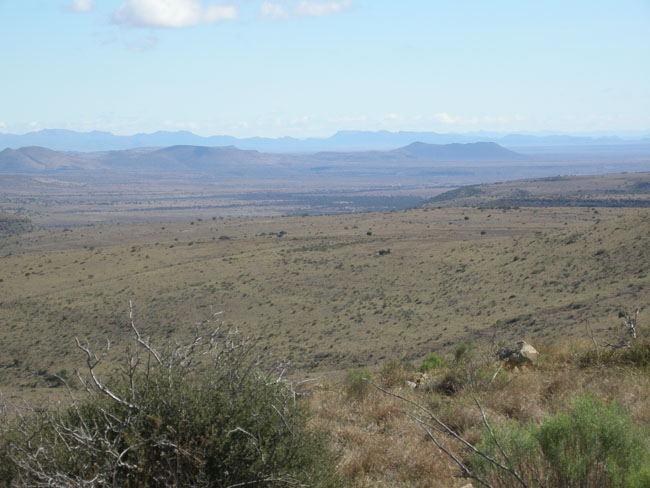 |
| ...white knuckles... |
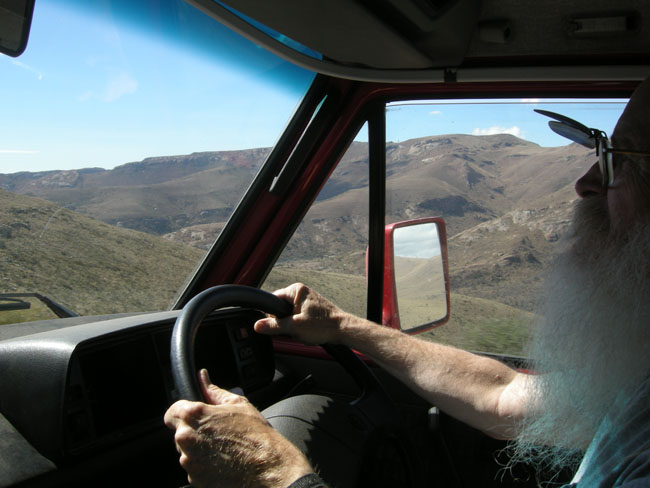 |
| And evidence of anteaters |
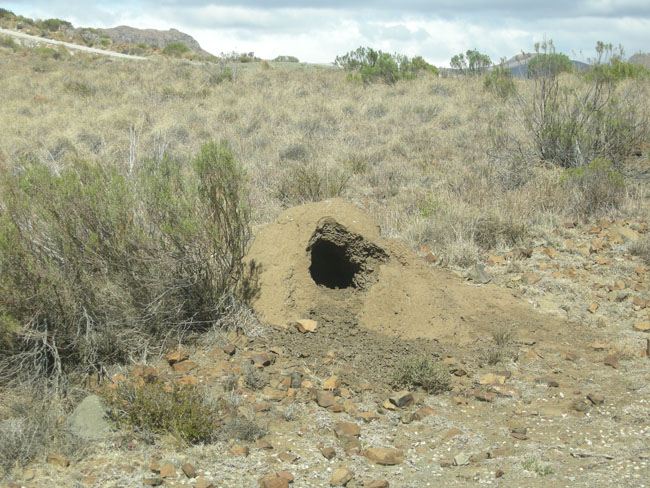 |
| The namesake Mountain Zebras of the park |
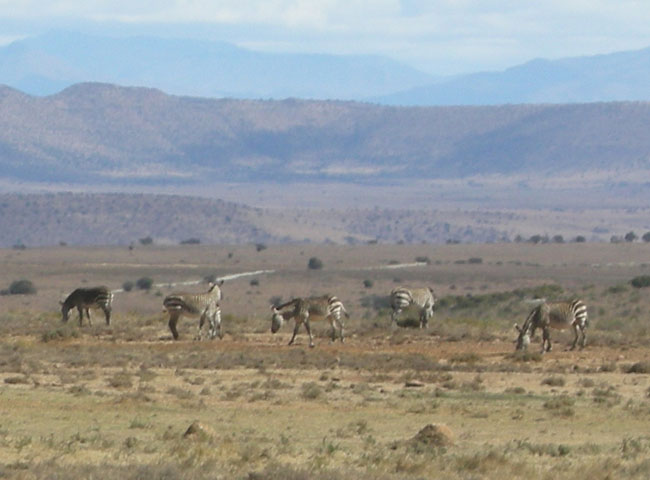 |
| Distant Black Wildebeests |
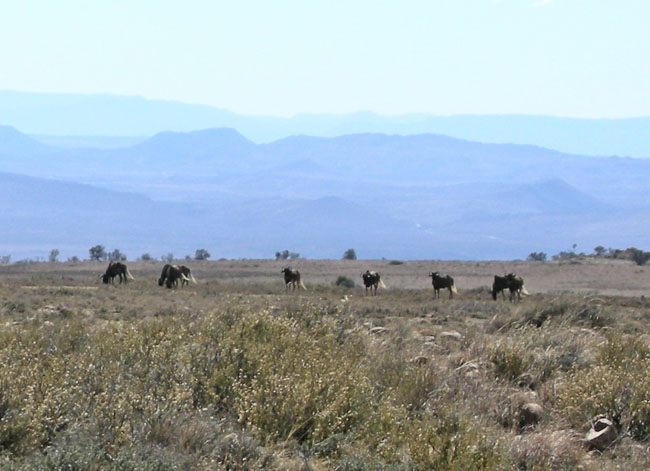 |
| These zebras seemed to be posing there to be photogenic. |
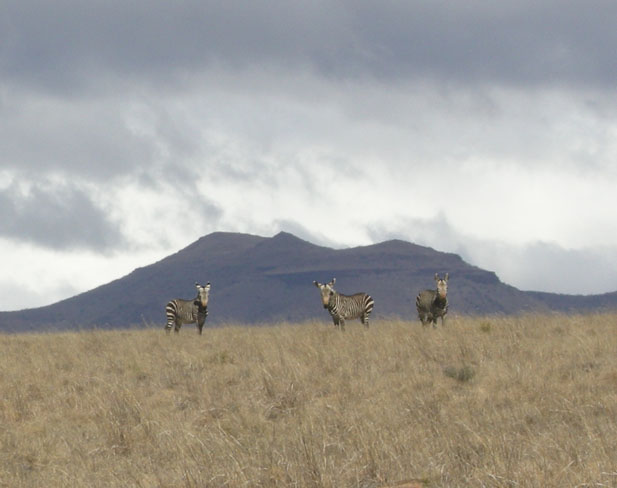 |
| Springbok |
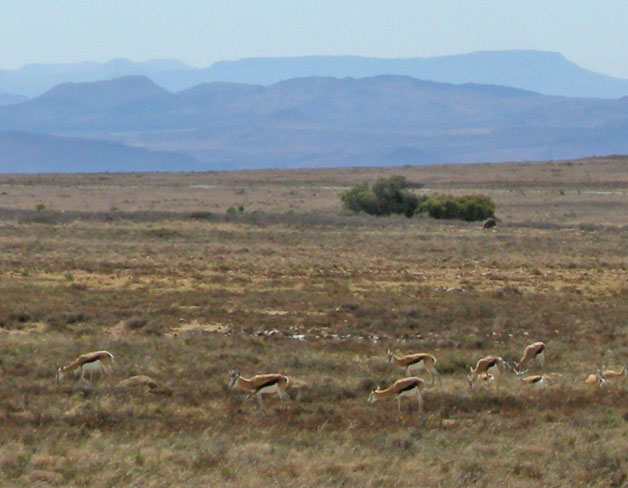 |
| While scanning an area like this with binoculars, we spotted a lioness disappearing into a distant small stand of trees. Far too far away to photograph, it would prove to be the only lion we saw in South Africa. |
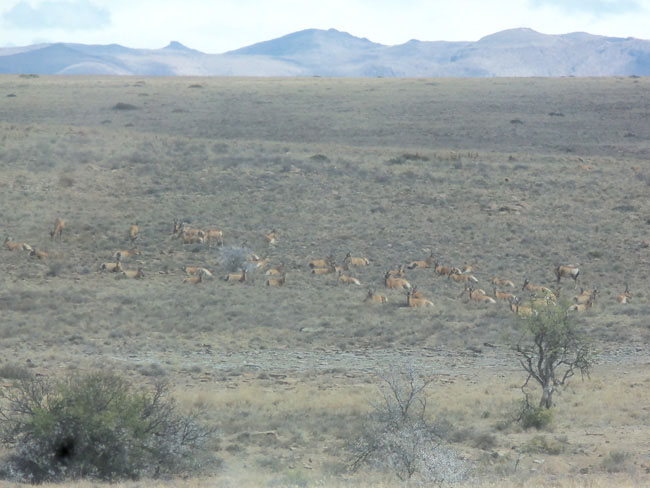 |
| Eland |
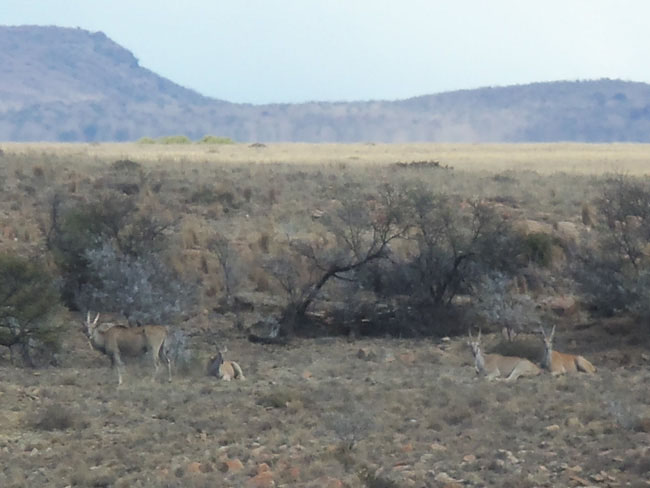 |
| Female kudu |
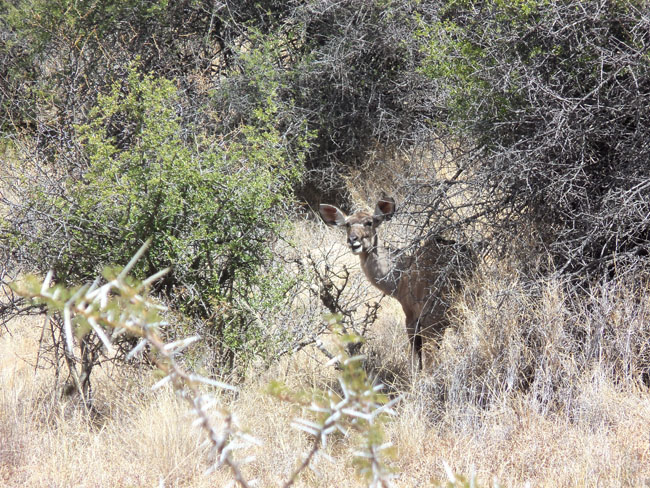 |
| A yellow mongoose appeared just as we were leaving. We saw many mongeese on the trip, usually as low streaks crossing the road, but this was the only one sitting still long enough to get a picture. Shortly after this it turned attentioon back to the hole it was digging. |
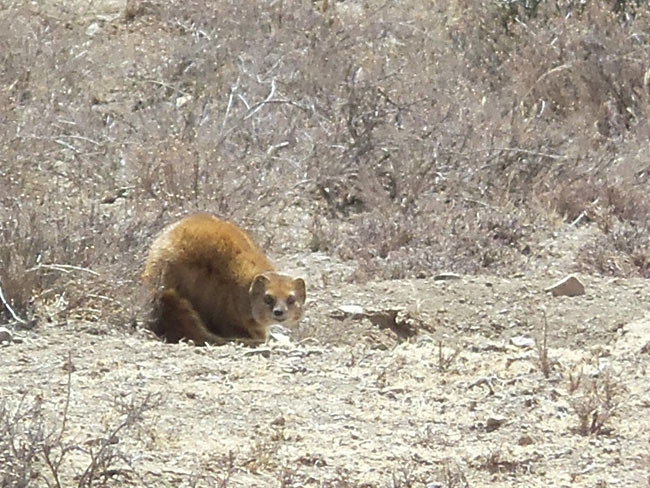 |
| More alien invaders: this time Opuntia cactus (prickly pear) on the fringes of the fields |
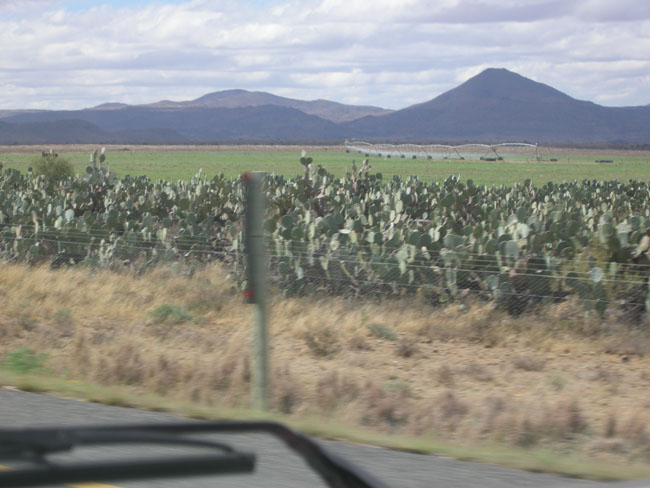 |
| Central South Africa is an eroded landscape, with flat-topped hills where some of the sandstone proved a bit more resistant to weathering. From here the land climbs in a series of plateaus like giant steps to the higher ground in the east, then drops off at the Drakensburgs and still lower to get down to Kruger.. |
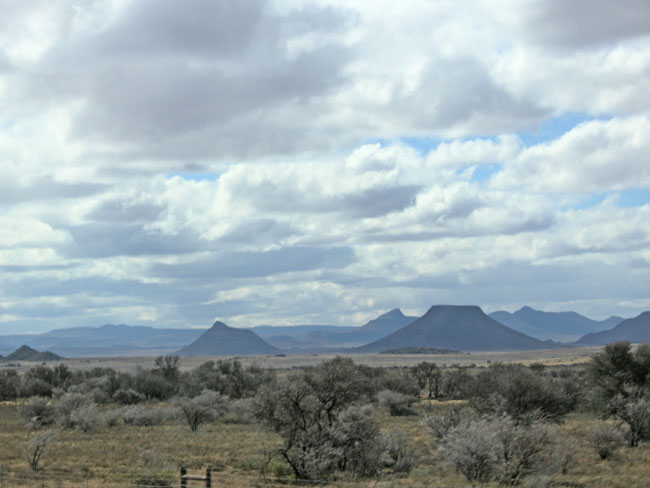 |
| We headed north from Mtn Zebra towards Bloemfontein on our way to the Drakensbergs. Half-way there lies Gariep Dam on the Orange (Gariep) River. It has cabins and a campground on the lake. Our camp on the lake... yes, those are whitecaps. |
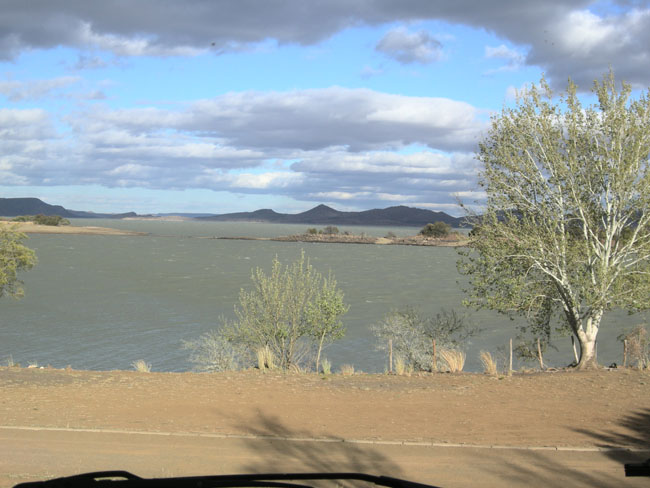 |
Here's the trick... the slower vehicles drive in the breakdown (and hopeful hitchhiker) lane. Everybody else passes them. Sometimes there are passers passing the slow passers. Repeat in the oncoming direction. Add a 120 kph speed limit. Convince your reflexes to operate properly for the "wrong" side of the road.
Relax, you're on holiday! |
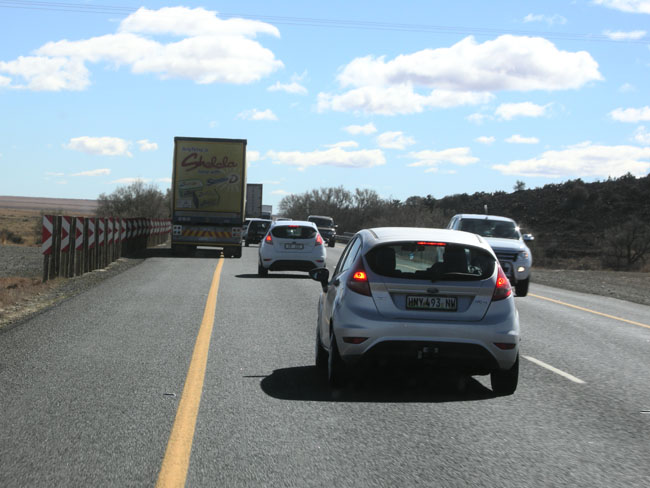 |
From Bloemfontein we turned east towards Lesotho and the Drakensburgs
Oh... another note of "things seen along the way":
See the Stop sign? Quite frequently intersecting roads would have people trying to hitchhike or flag down the periodic local busses (BazBus) or pickups-cum-taxis.
Some people would be waving 10 or 20 Rand notes ($1 and $2) to improve their luck.
But the person who made this section of the road memorable was waving an entire, large, fish. Since we'd just passed a lake, we assumed it was freshly caught. |
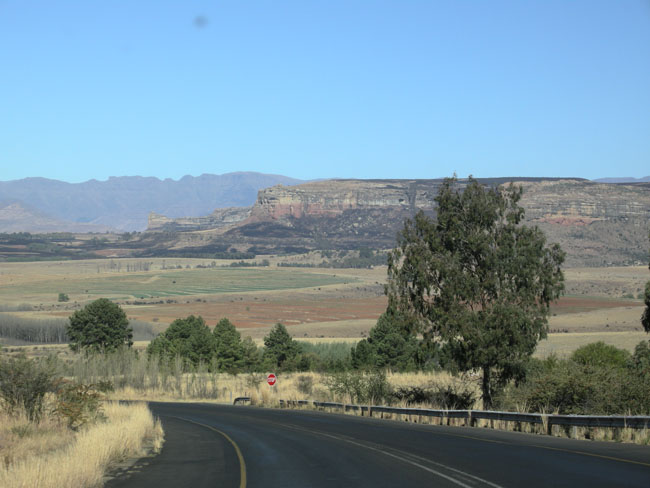 |
| The Drakensburgs are that wall of mountains forming the horizon. |
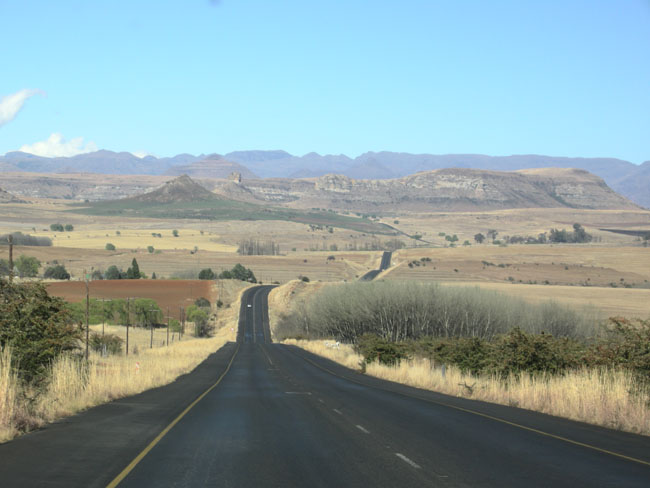 |
| We didn't go into Lesotho, we arced along its northern border through increasingly scenic terrain. |
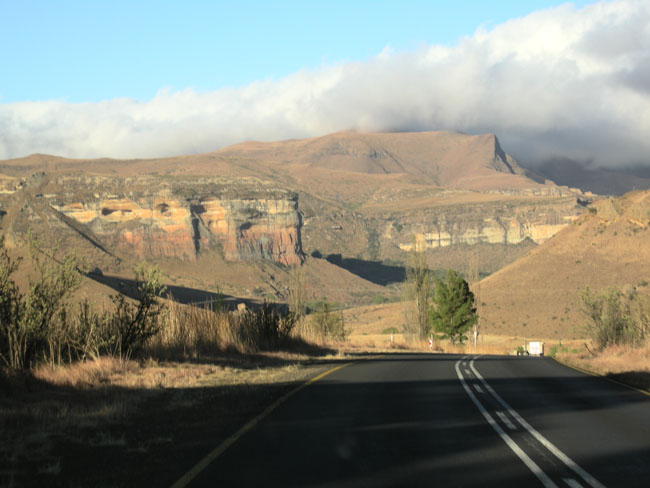 |
| We got to Golden Gate Highlands National Park at sunset, just in time to see the phenomenon for which it was named. |
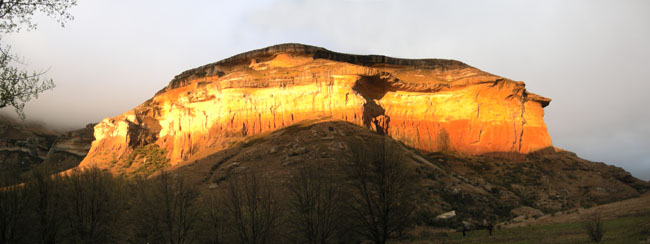 |
| Here it is the following morning. Dick usually feels like that in the morning before coffee, too. |
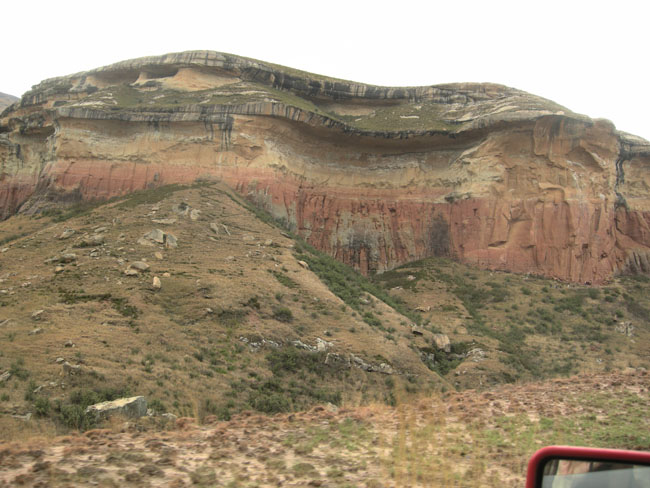 |
| The surrounding area had a barren beauty |
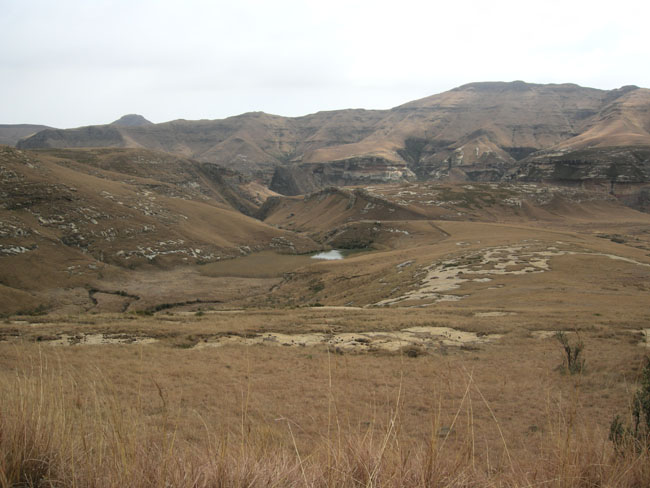 |
| |
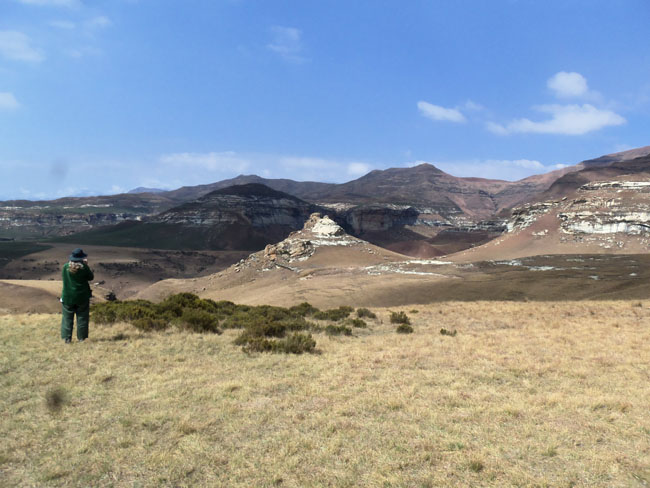 |
| |
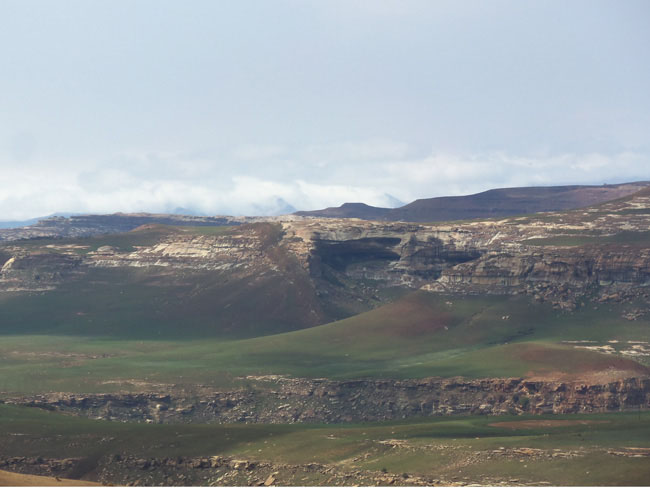 |
| They were burning the fields |
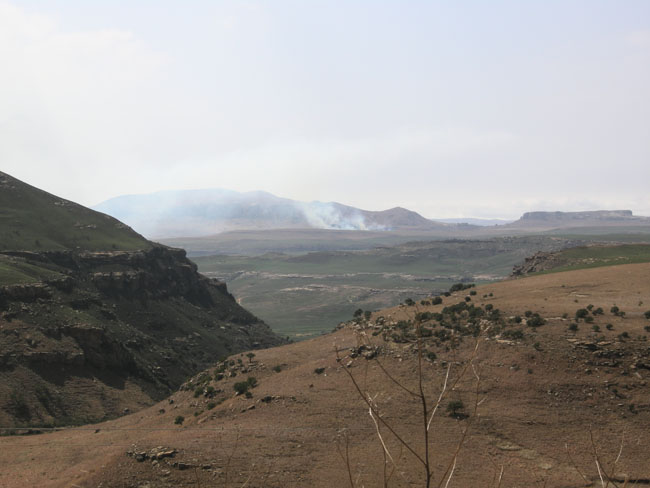 |
| |
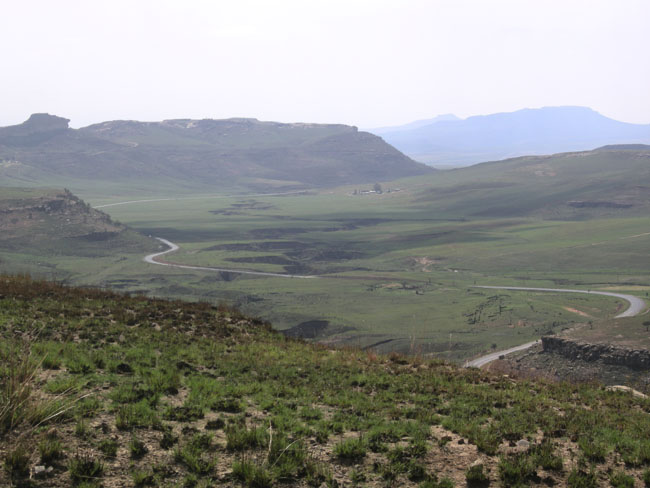 |
| Pastures had interlopers. |
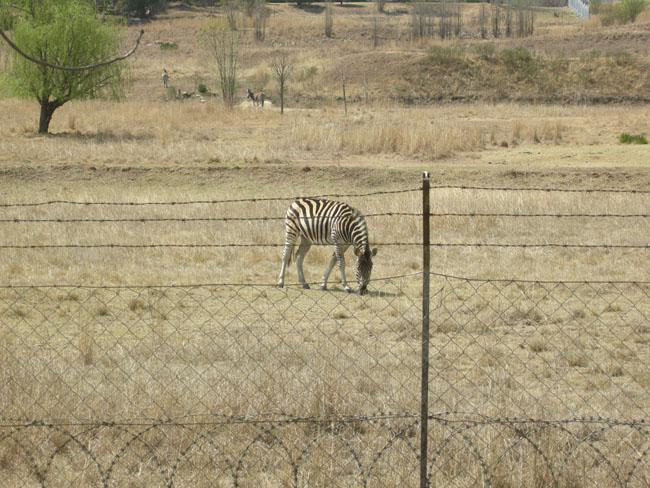 |
| Plane trees are what I assumed I would see throughout the interior but we only started seeing them here in the east. |
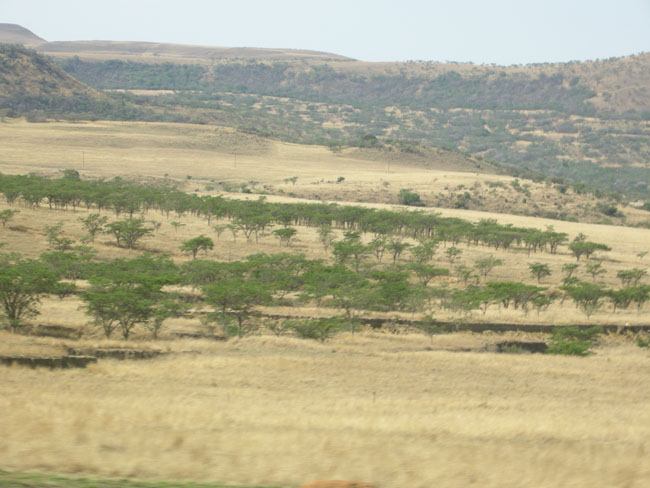 |
| Further south along the escarpment is "the amphitheatre" |
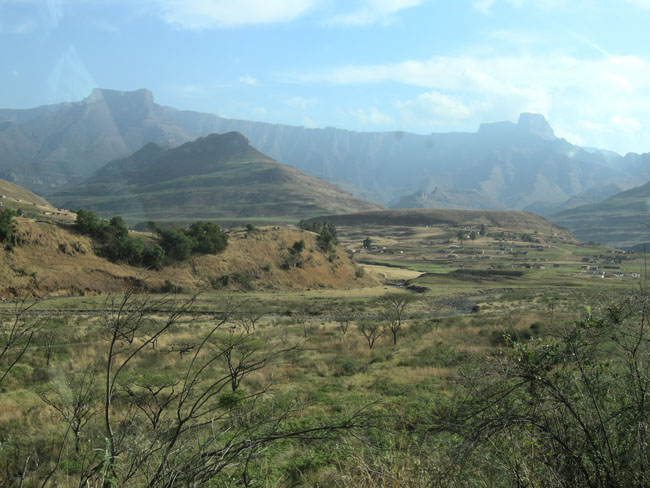 |
| But the air was very hazy due to field burning ... to clear the stubble and create firebreaks around houses and settlements. |
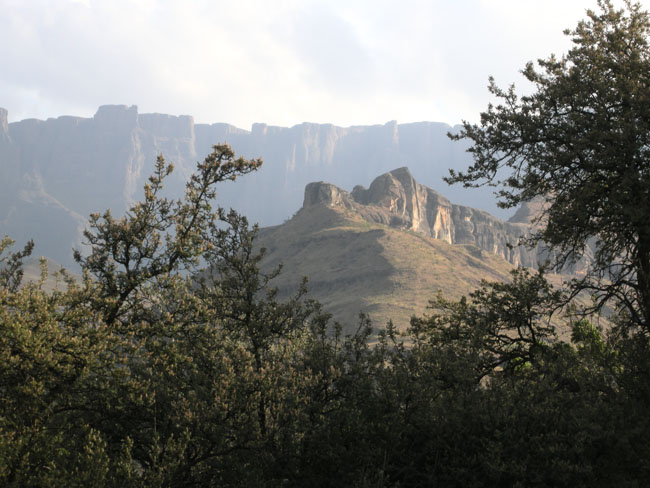 |
| Yes, I found a protea |
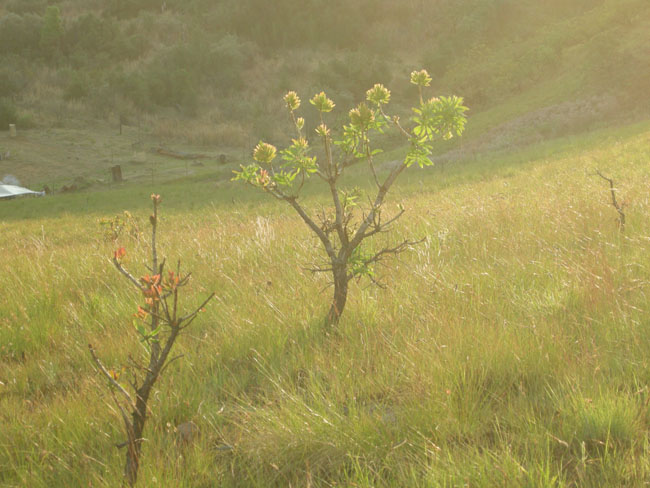 |
| At the Royal Natal National Park's Mahai Campground folks went up on the hillside to watch the sun set. |
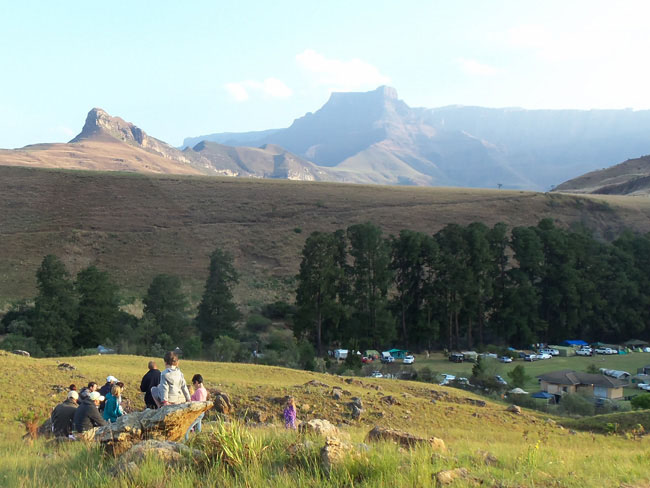 |
The next day was a holiday so there wasn't as much smoke in the air.
We took a short hike towards the base of the Ampitheatre. |
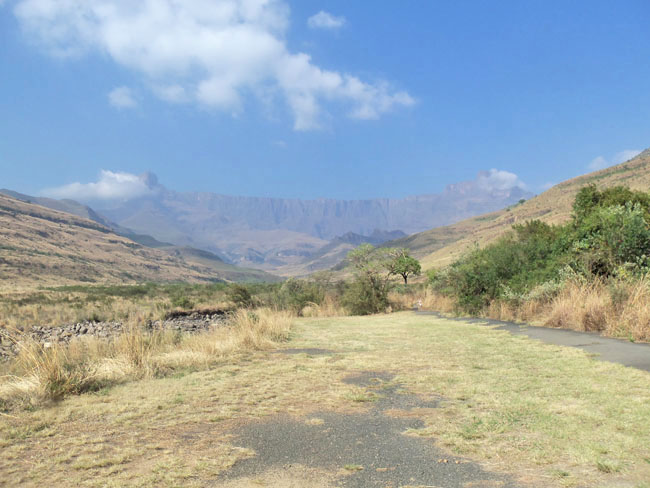 |
| Bottlebrush (?) flowers |
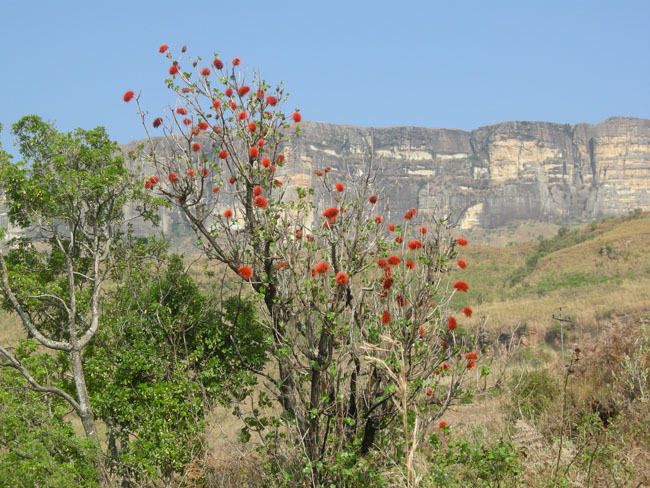 |
| Another splendid starling |
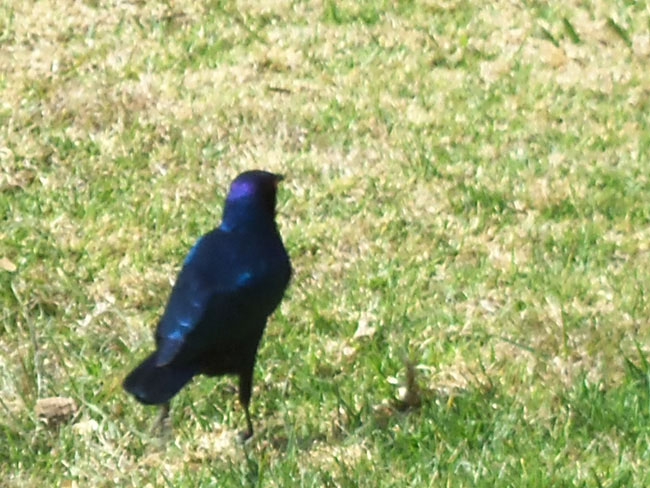 |
| The surrounding villages looked relatively prosperous. |
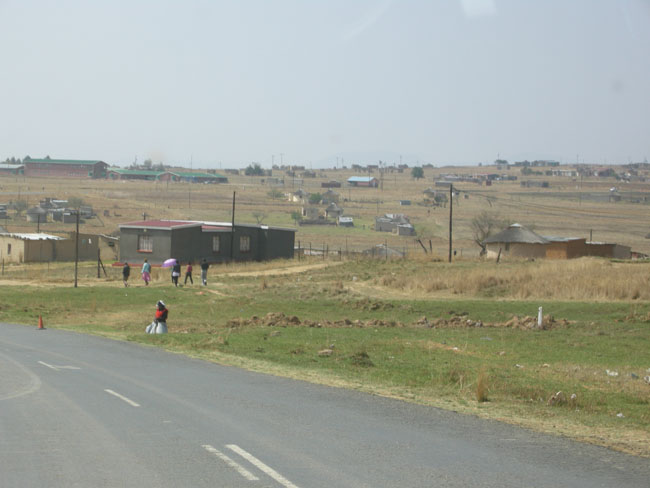 |
| but you had to keep a sharp eye out for livestock |
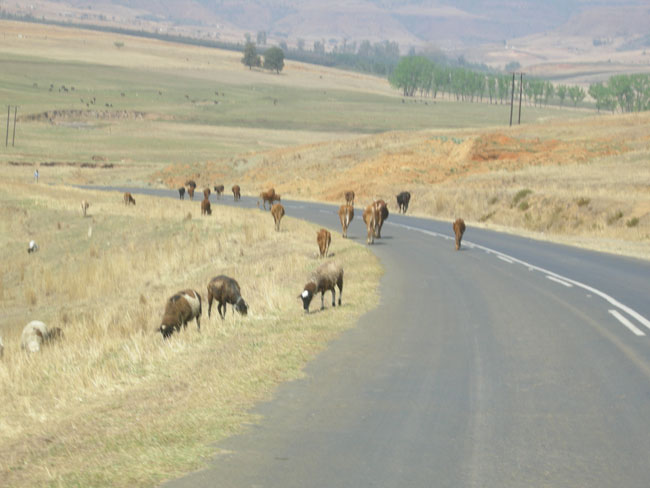 |
| We stopped for lunch at a roadside tribal gallery |
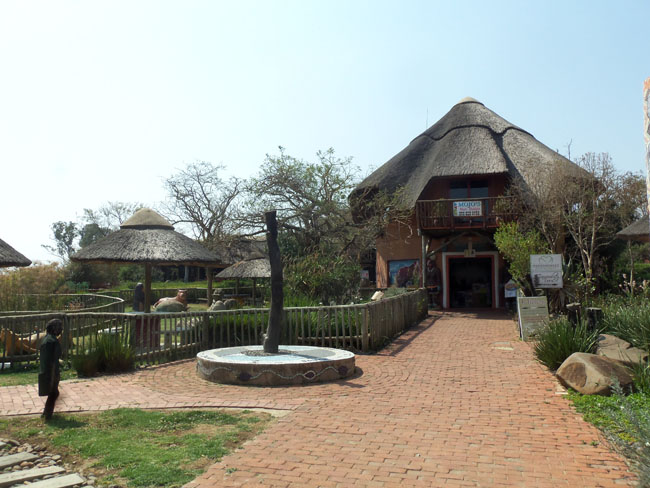 |
| And were able to get a good photo of the underside of the thatching |
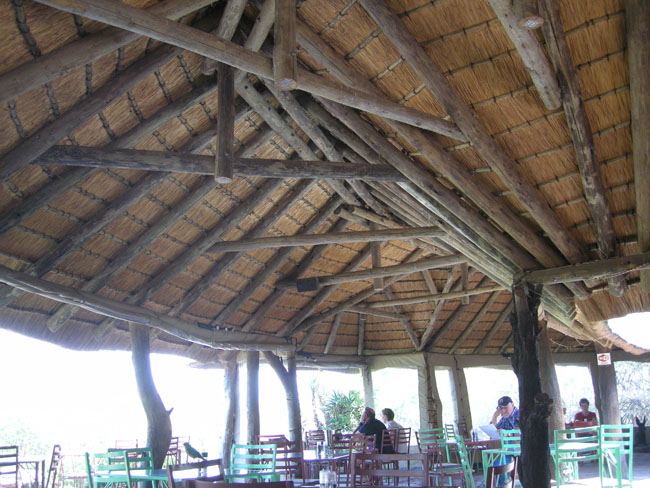 |
| Lots of burned fields... |
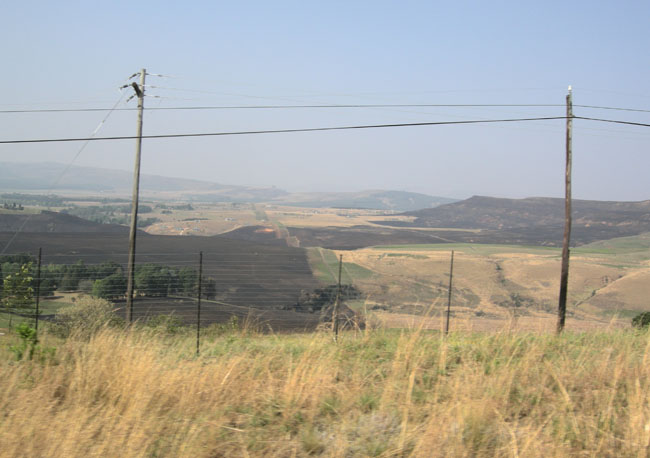 |
| and the afternoon got smokier as we went south, following the Drakensberg range. We even bypassed Cathedral Peak due to lack of visibility (and breathing). Instead we went further south to the Champagne Castle area. |
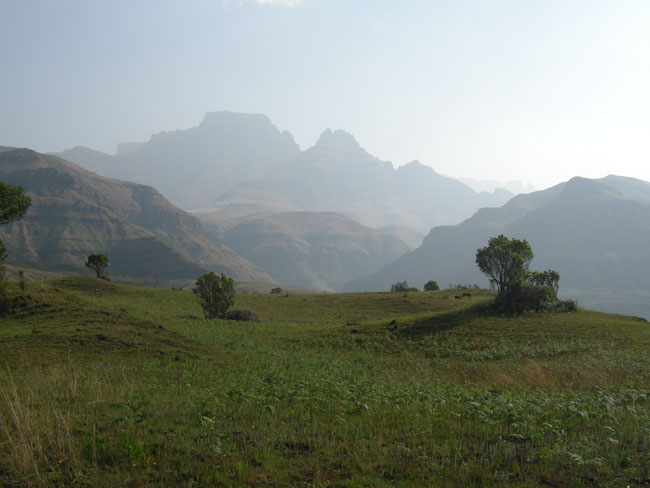 |
| |
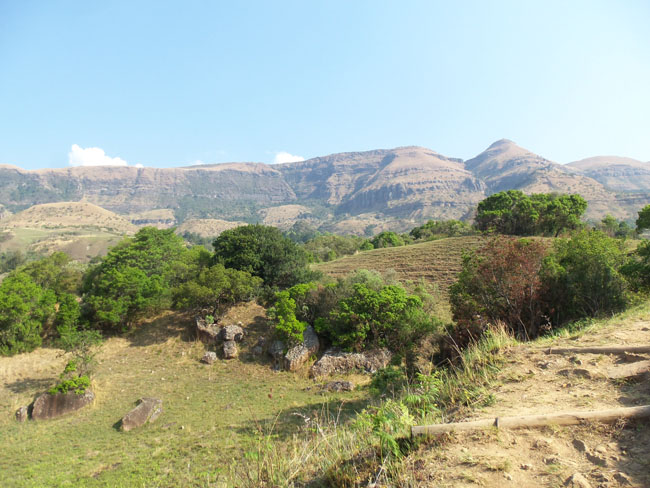 |
| We appreciated the signs but by the time we passed through, they had usually fixed the holes. It was the ones they hadn't gotten around to signing that were the problem. |
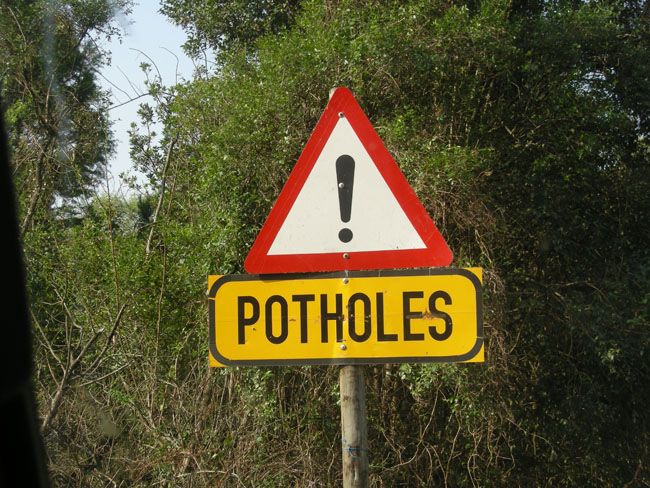 |
| Approaching Monks Cowl, we turned into the Dragon Peaks Resort (and campground). They seemed to have a resident zebra... |
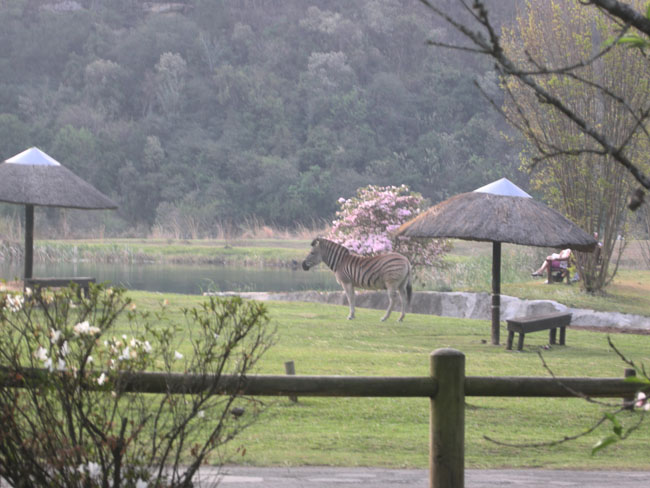 |
| ...and companion. It looked like a cross between a donkey and a zebra. |
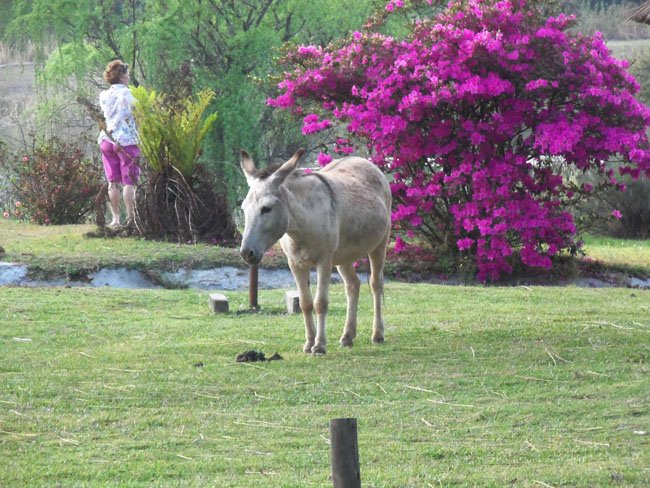 |
| The view of Champagne Castle from the campsite in the morning. Some of the peaks in the 150 mile-long Drakensberg range reach to over 11,000 feet. |
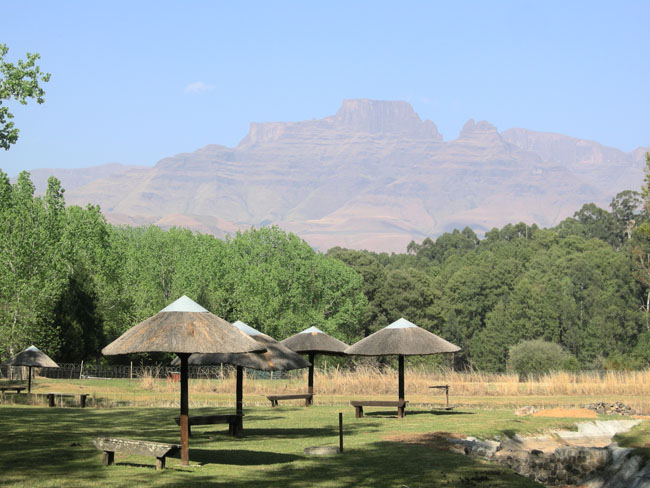 |
| The day's clearer air inspired us to back-track and try for Cathedral Peak again. |
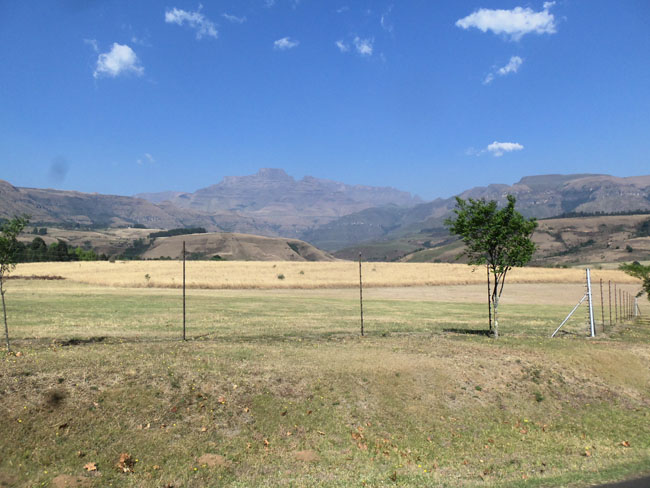 |
| We stopped at the local weavers co-op, but they were not working the looms at the moment. Their very nice rugs were available though. |
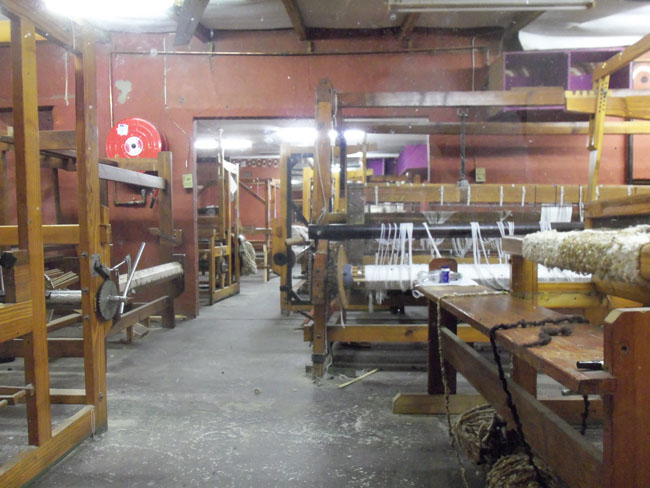 |
| We passed through several more villages |
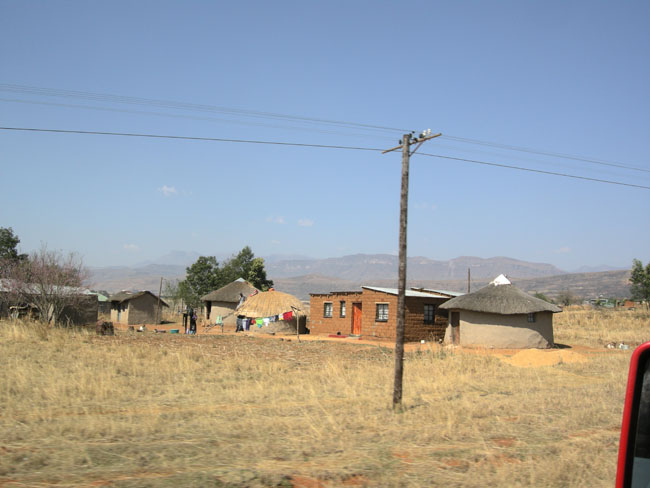 |
| |
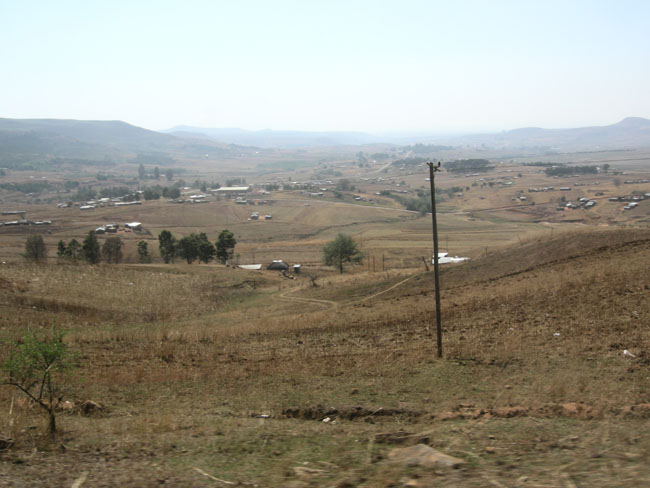 |
| to get to Champagne Castle. |
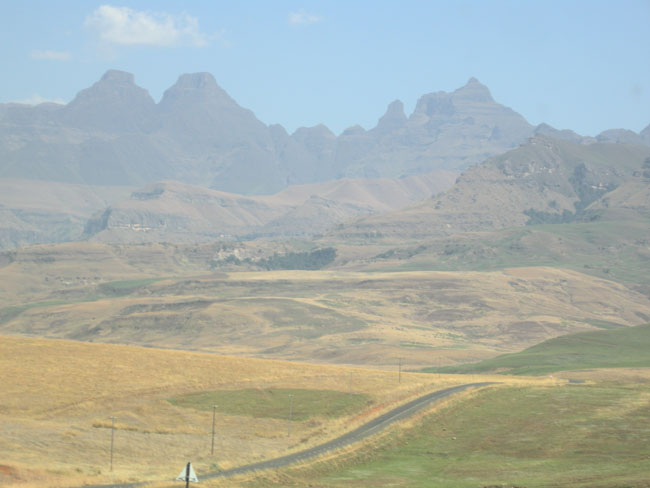 |
| |
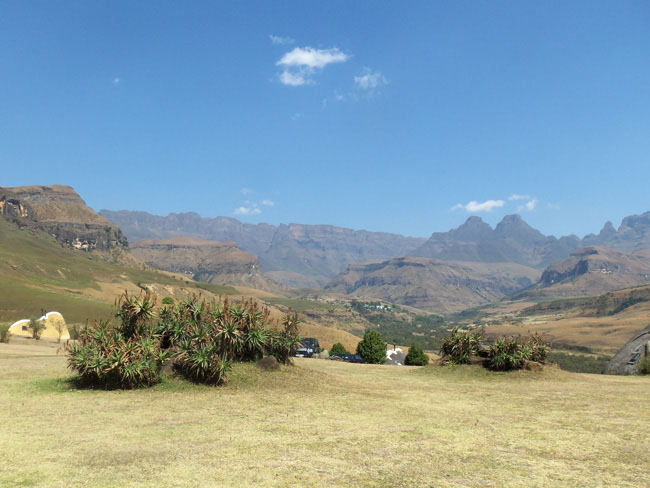 |
| There were many San (used to be called bushmen) paintings in surrounding caves. Most needed advanced scheduling to visit so we saved that for next time. |
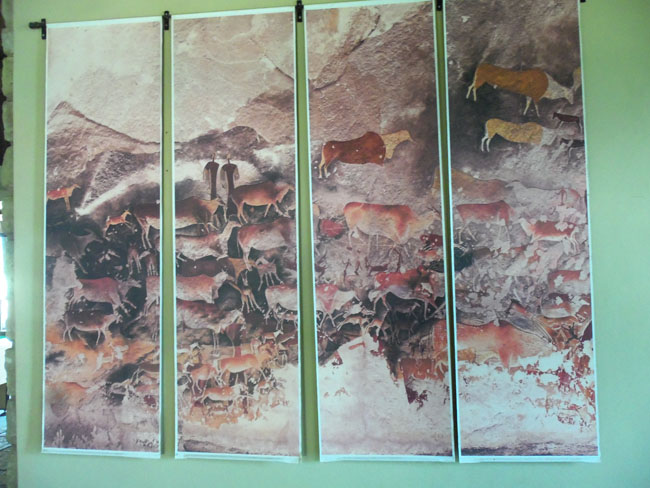 |
| Large bug in parking lot wouldn't probably have paused long enough to get it's picture if it hadn't met a car first. |
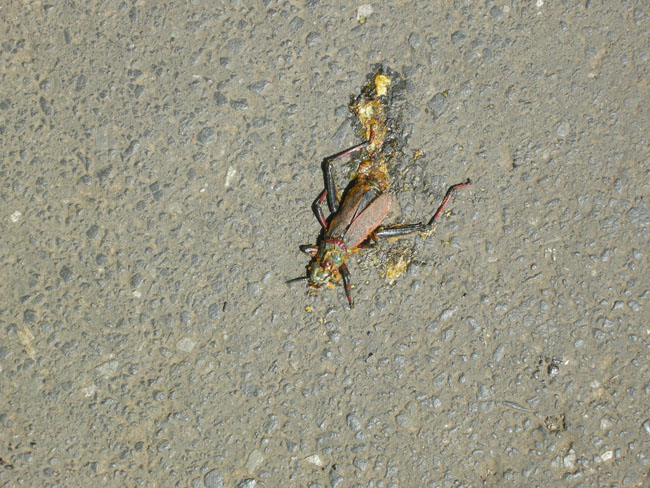 |
| We wandered a bit in the park and decided it was just too smokey. We decided to cut short our Drakensberg visit and head up to Kruger Natinonal Park. We'd planned to skip Kruger to avoid malaria, but local travelers said the chance of malaria was very slight as they had not yet had rain. |
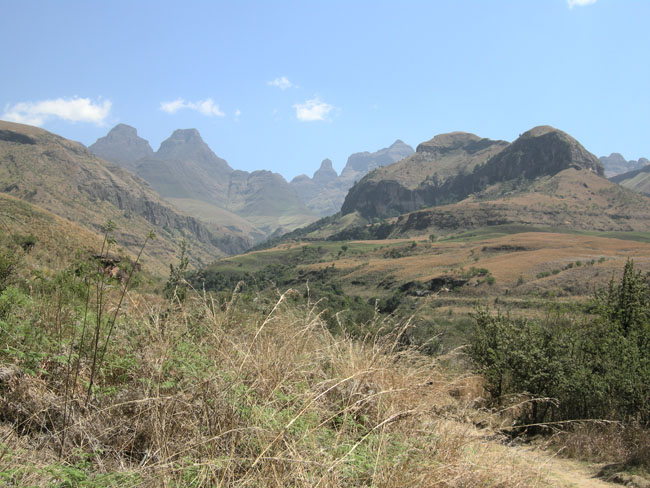 |
| More rural life. Here's a brick house under construction. Note satellite dish. |
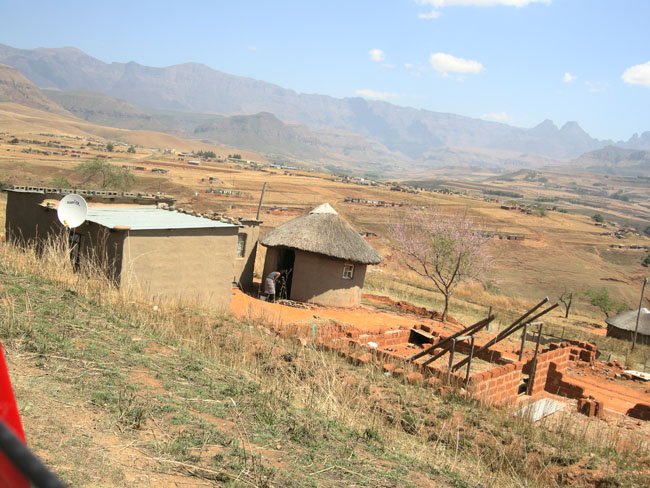 |
| |
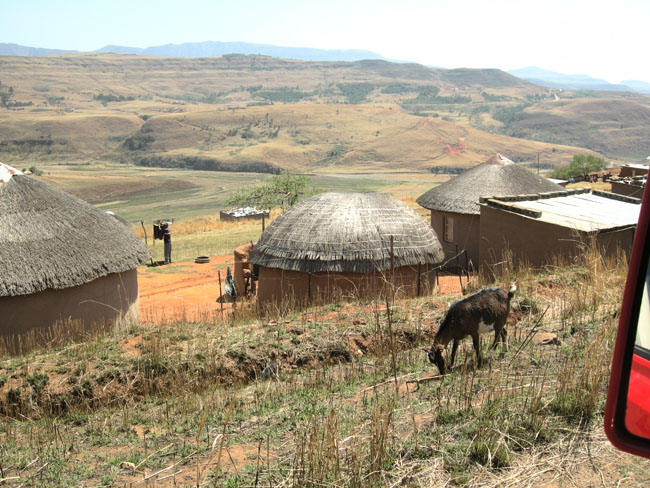 |
| |
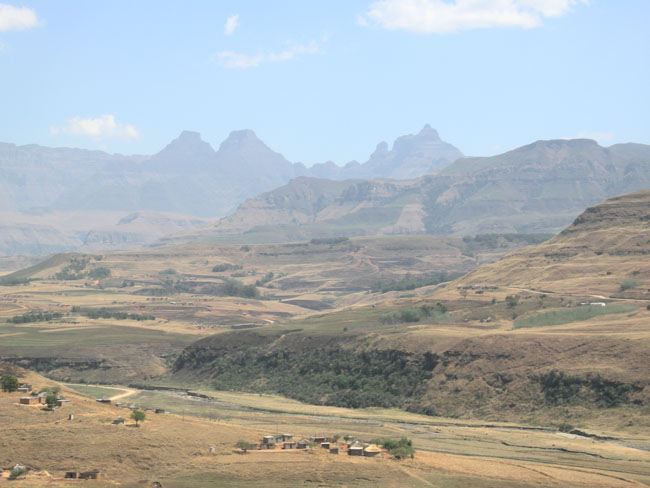 |
| Here's the local bus terminal eqivalent. |
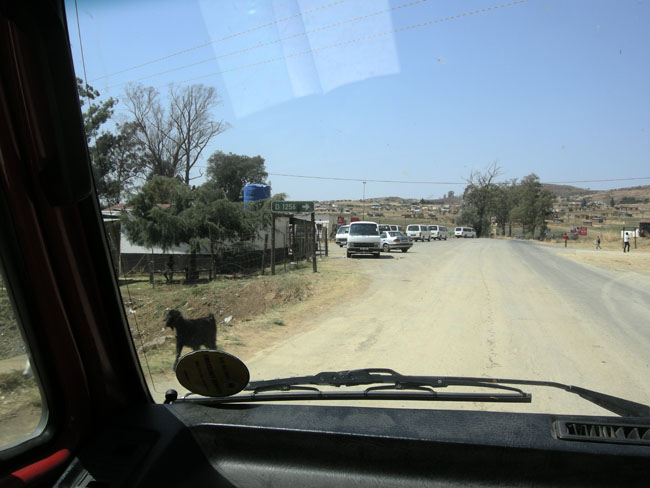 |
| Thatching |
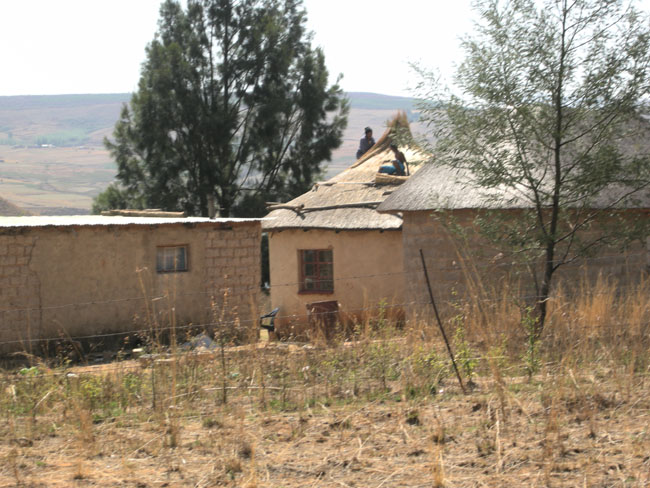 |
| Stopping for lunch in Ermelo, we chanced upon the really bizzarre "Art Madness Cafe". Good food and friendly people too. |
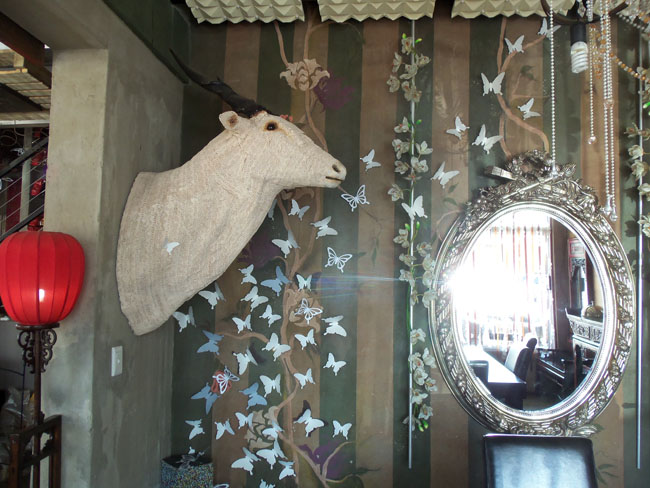 |
| We'd occasionally pass massive industrial installations. |
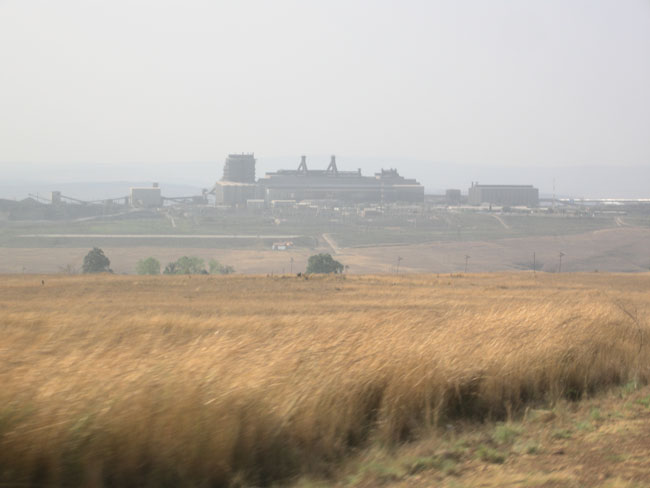 |
| The landscape got drier as we went north |
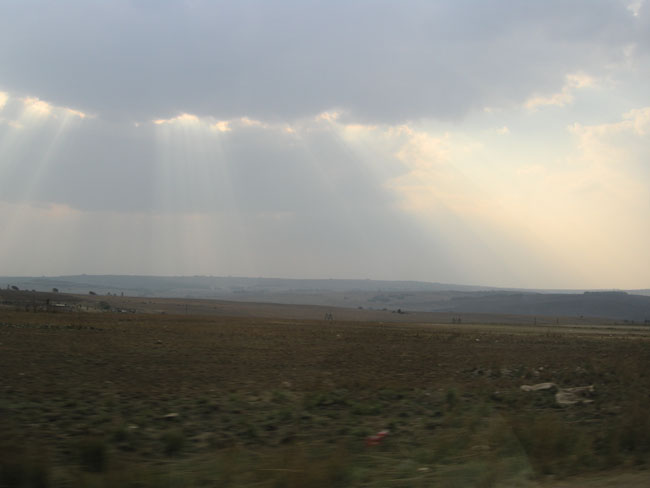 |
| Nearing the major city of Nelspruit, we pulled off to Nature's Gate Resort (and campground). An hour's drive from here brought us to Kruger National Park. |
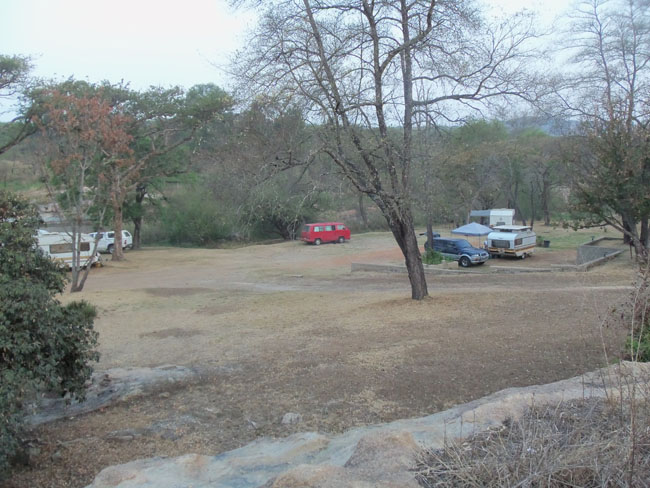 |
| The gate building at Kruger used the elephant skull as a table. |
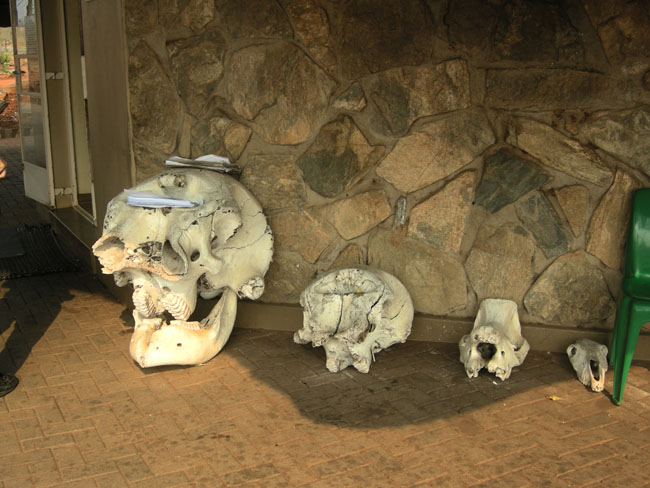 |
Lots of birds and animals: In just 24 hours we saw the following and many more that didn't hold still or were too far away.
This clutch of female impala weren't in too much of a hurry. |
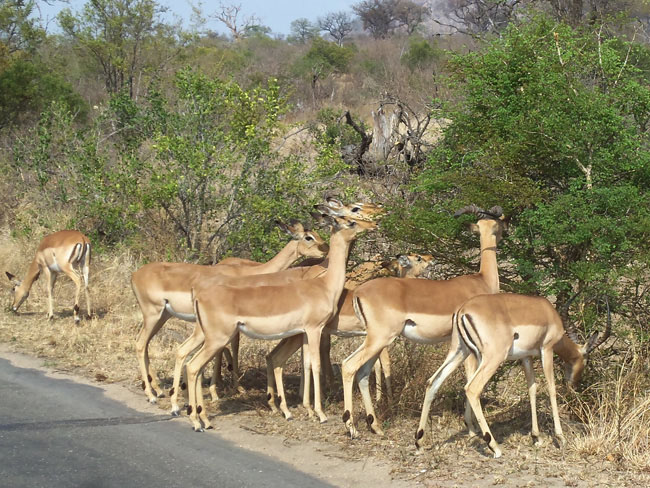 |
| Termite mound, taller than most we'd seen throughout the trip. |
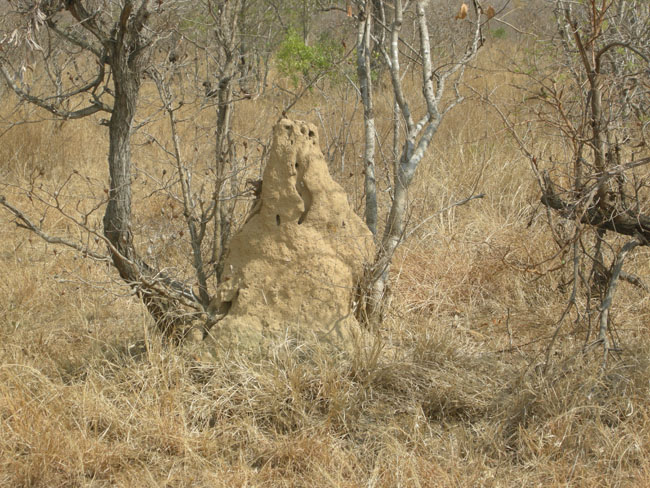 |
| Kudu |
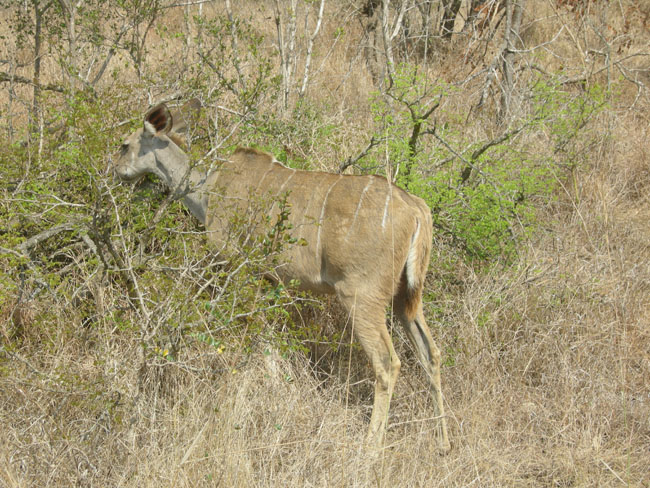 |
| Giraffe |
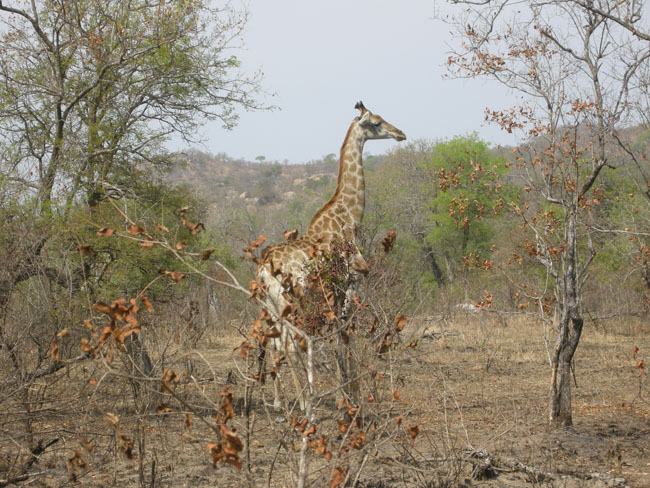 |
| Kudu |
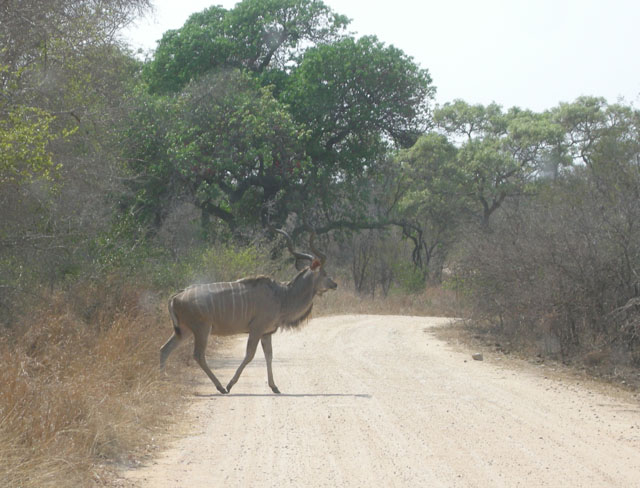 |
| |
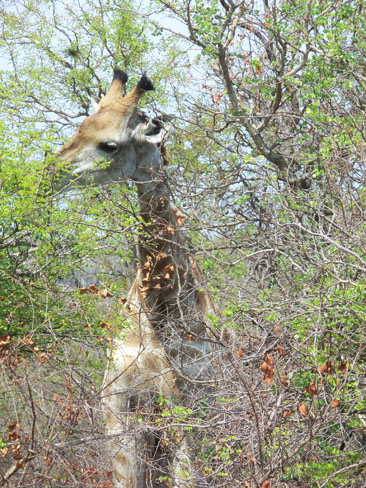 |
| Rhino |
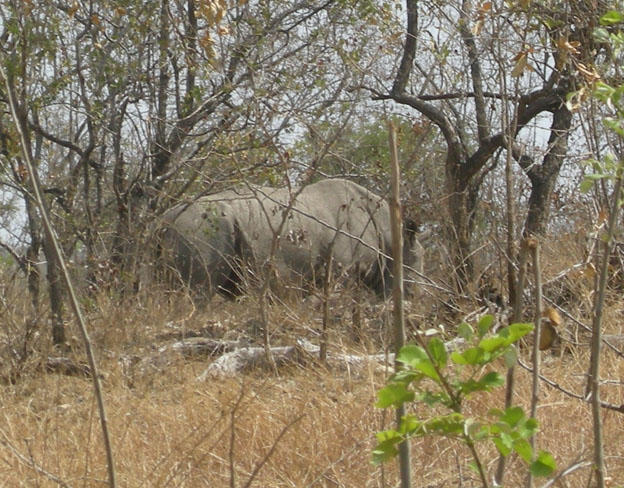 |
| First you see the buzzard, then you see the heron, then you see the goose and the rhino ... |
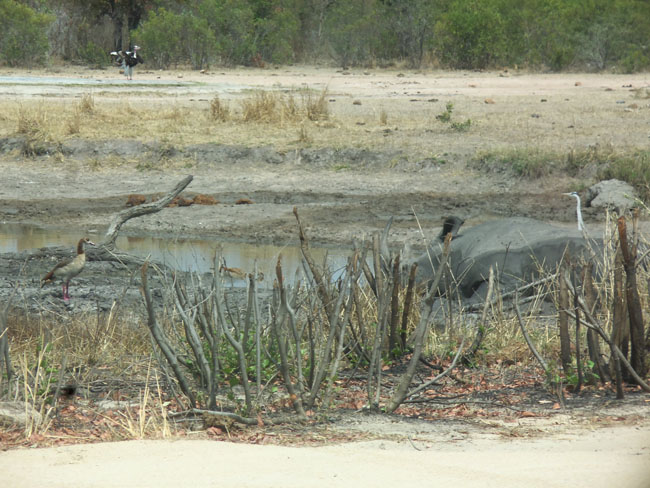 |
| |
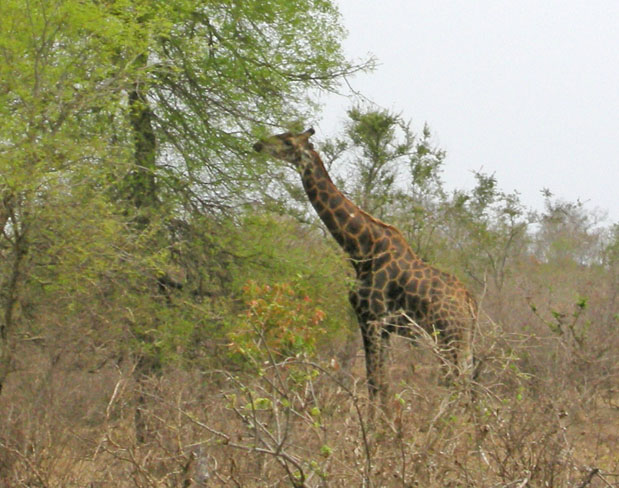 |
| |
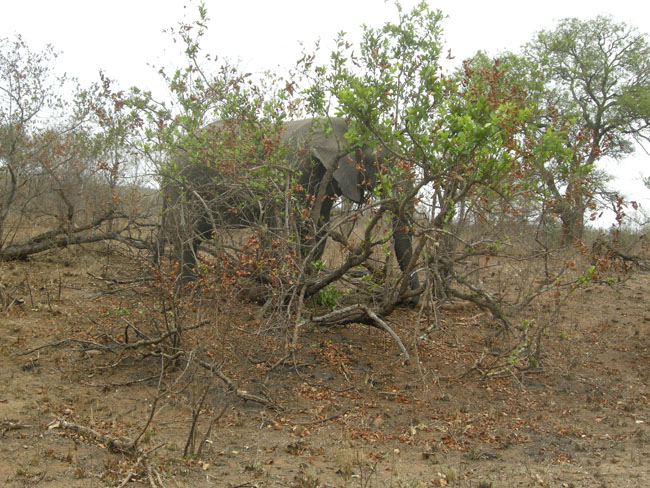 |
| |
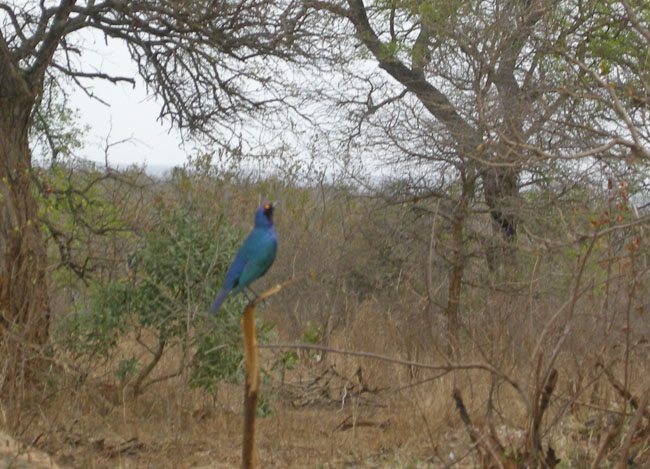 |
| Ground hornbill |
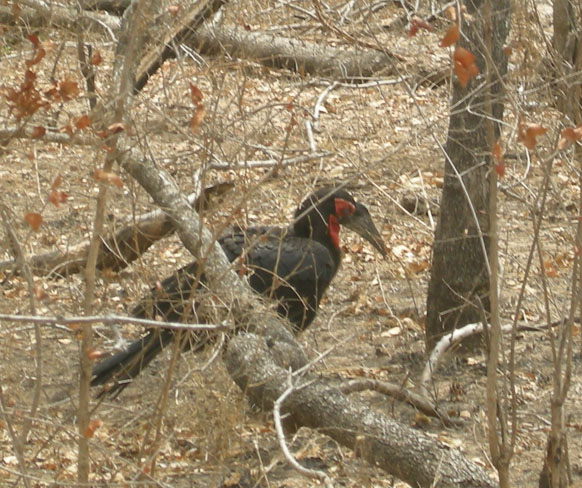 |
| elephant scar |
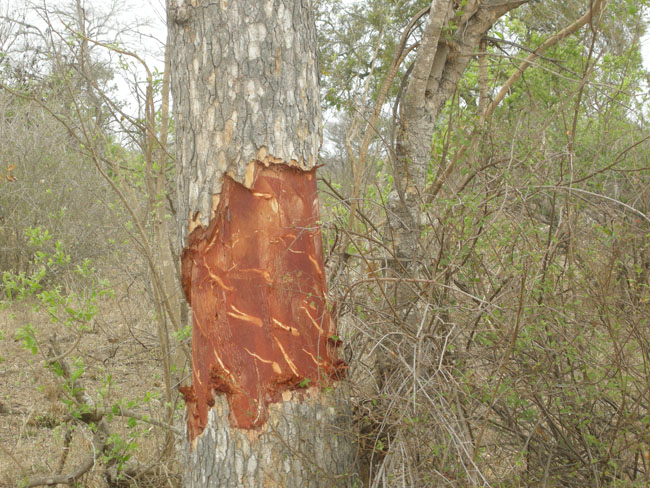 |
| Birds' nests |
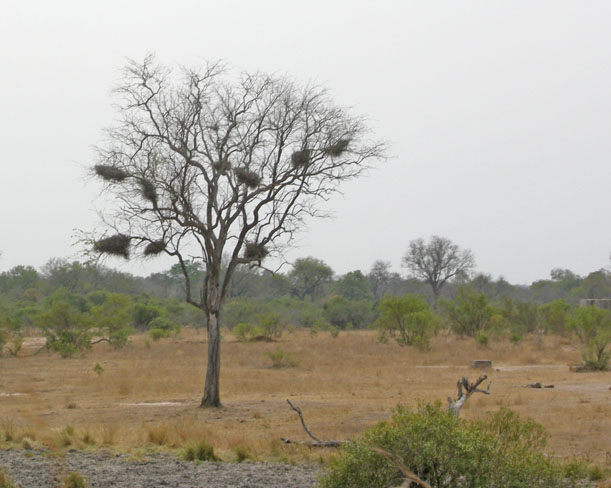 |
| Impala |
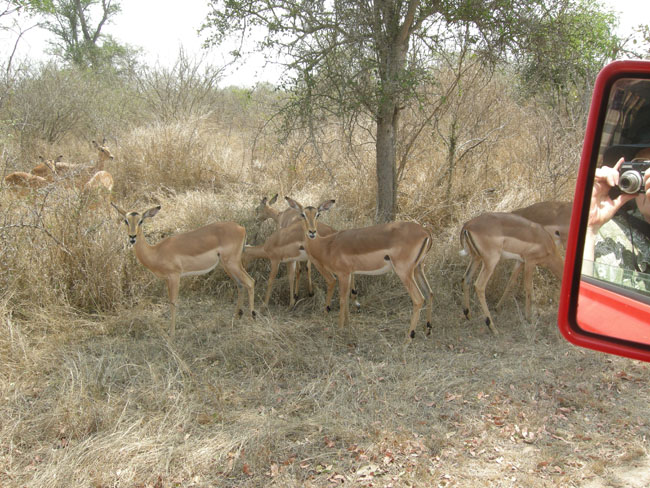 |
| Yellow-billed hornbill |
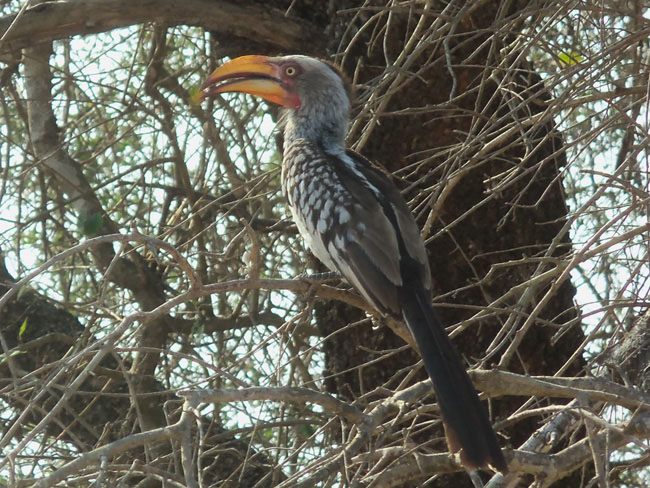 |
| Karen had been wanting to see a buffalo the whole trip. We finally found one. |
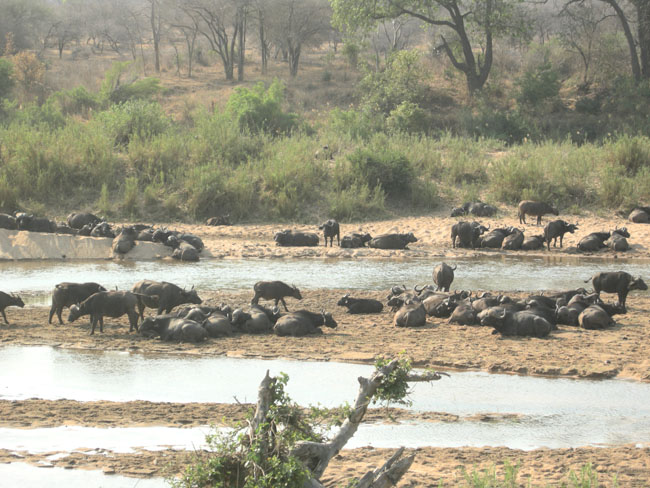 |
| Kudu |
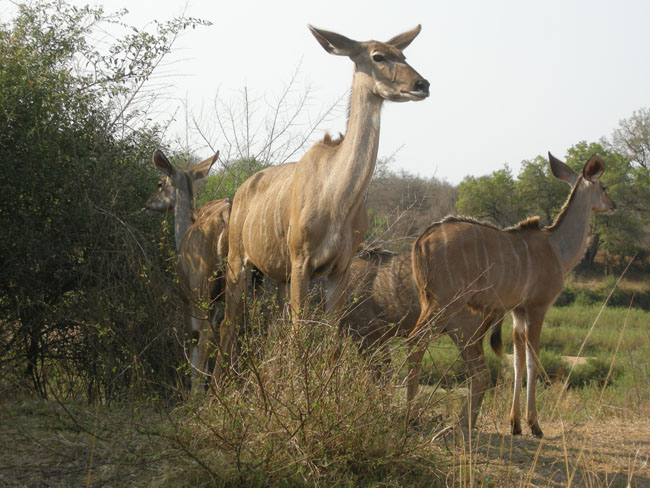 |
| Vervet monkeys |
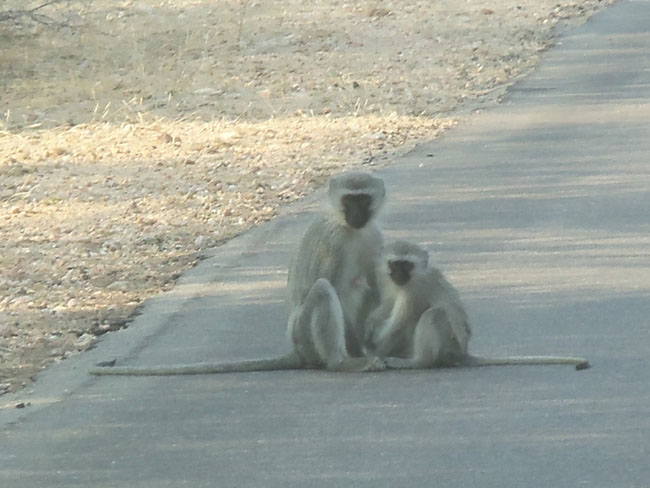 |
| Mattresses going somewhere (or just getting aired?) |
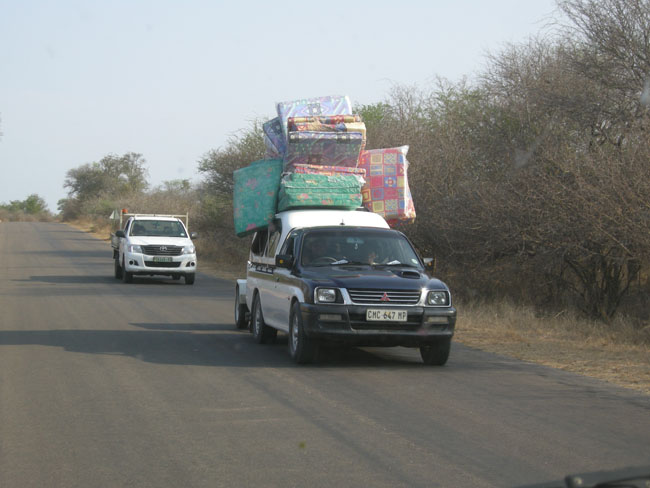 |
| |
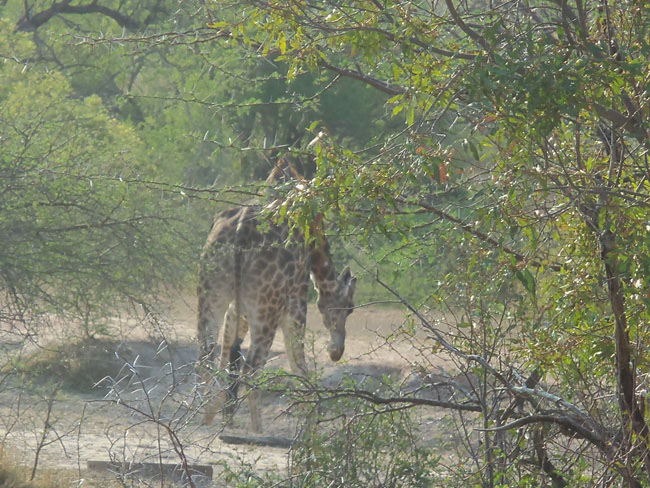 |
| trio of ground hornbills |
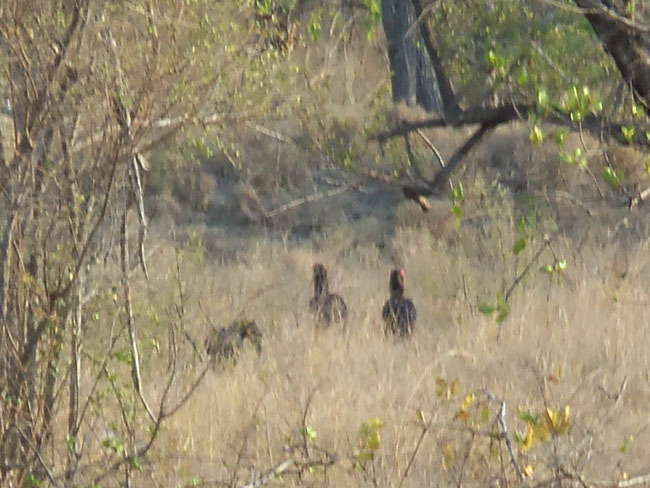 |
| |
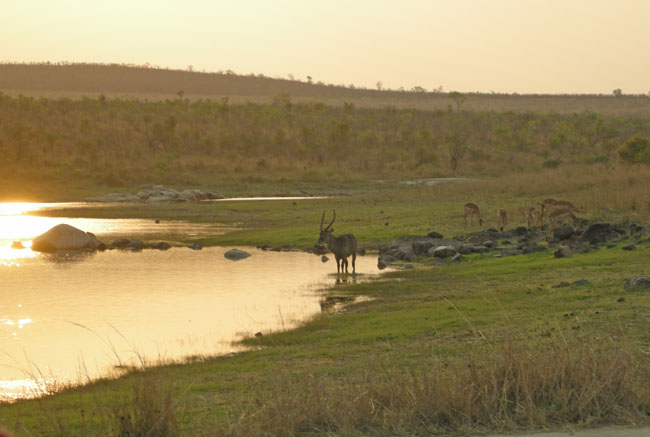 |
| |
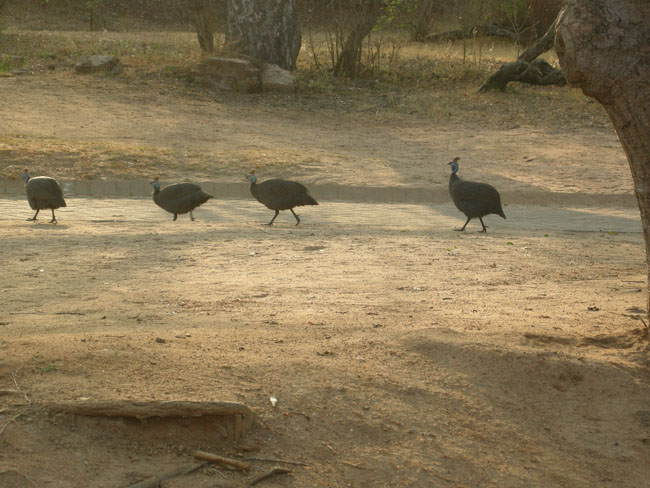 |
| |
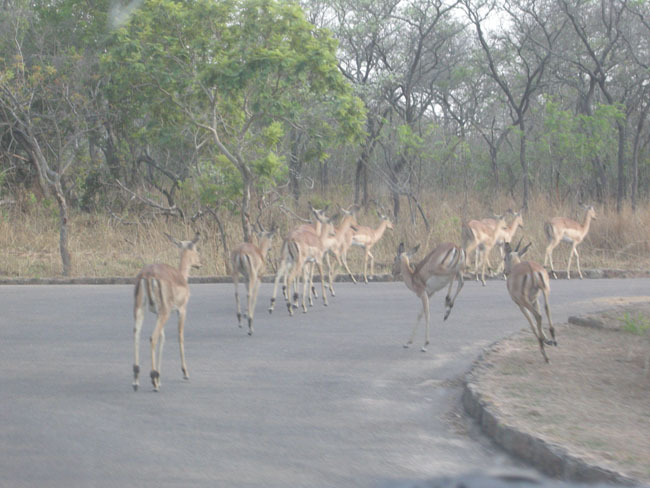 |
| Buffalo checking us out. |
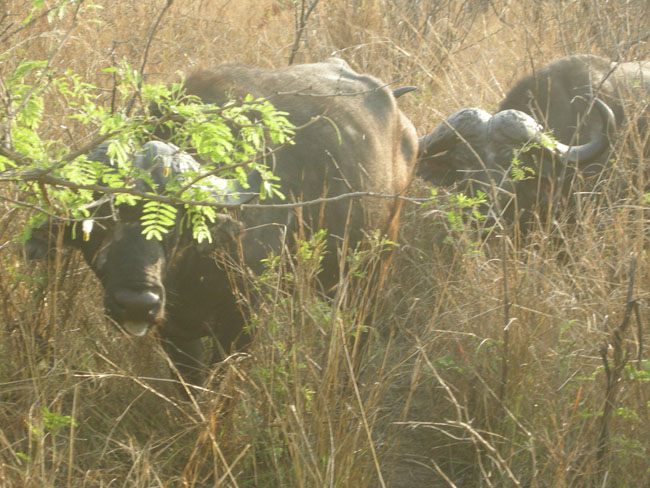 |
| Then the car dash lit up. Karen waiting for the tow truck on what was the hottest day of our trip (nearly 100F) |
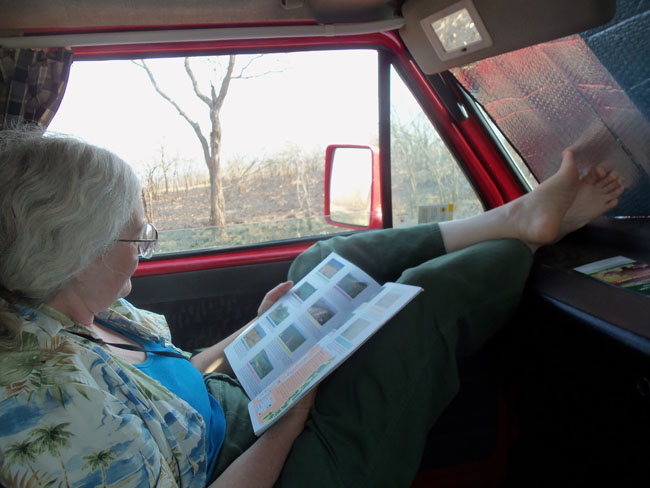 |
| The view wasn't devoid of life: note the communal spiders. But it was pretty bleak being stuck in a recently burned area. |
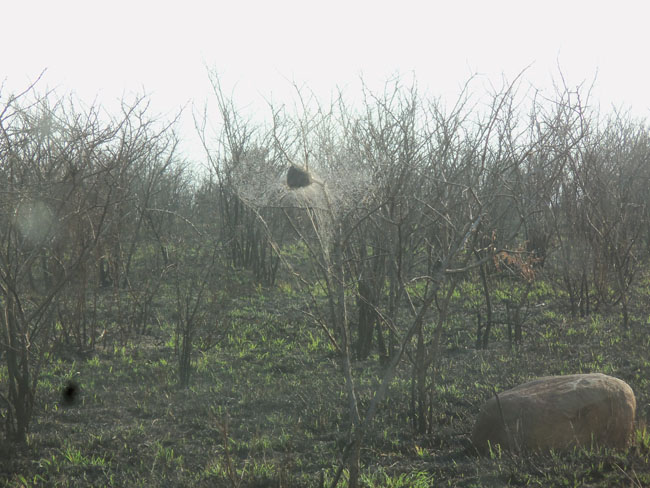 |
| The tow driver added water and had us follow him back to camp. He did what he could but after a couple of hours it was obvious it wasn't repairable here. Luckily there was space for us to spend another night in this campground. |
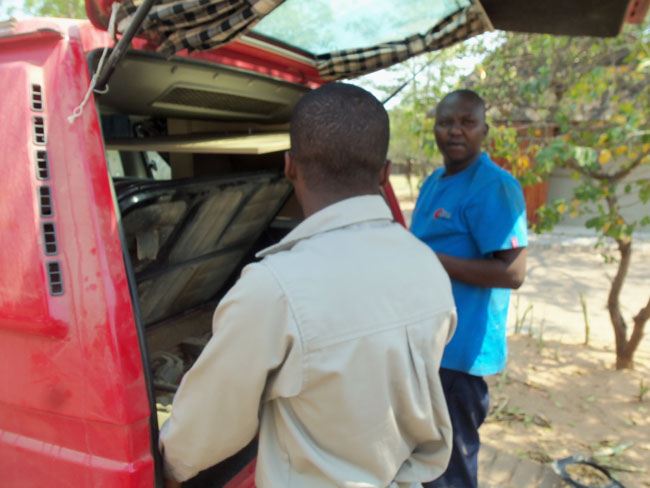 |
| Since we weren't driving out to see them, the wildlife helpfully came into the camp. |
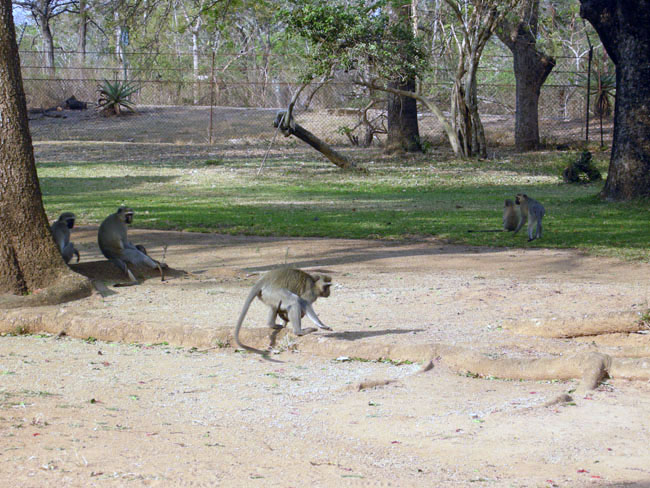 |
| There was space on the evening's night drive so we decided to take it. It started with a lovely sunset |
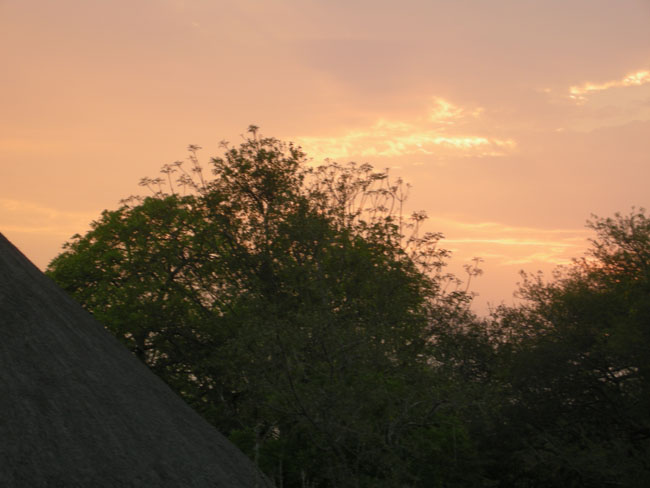 |
| Our night photos came out slightly better this time. Some of the blurs can even be identified: cameleon |
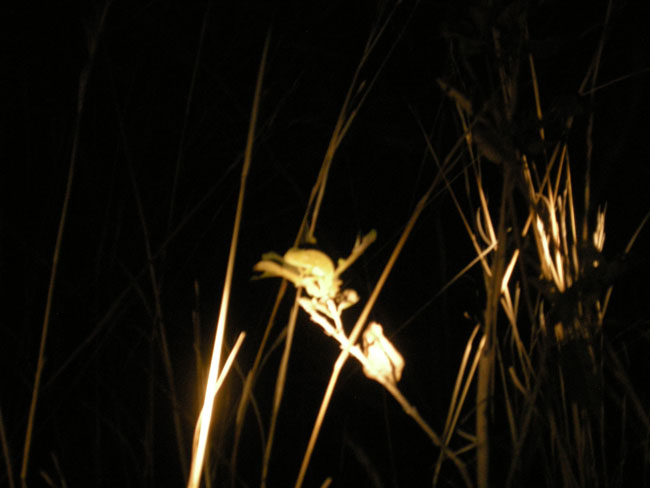 |
| owl |
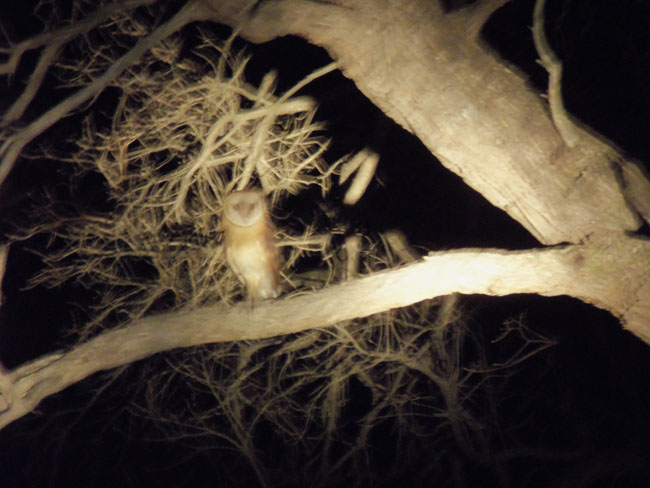 |
| hyena |
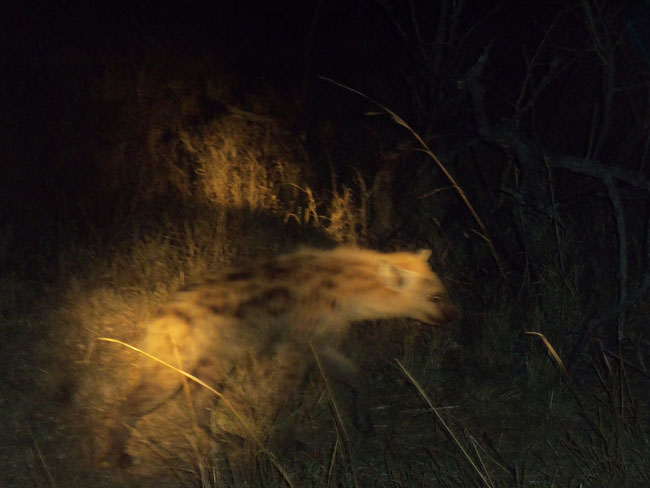 |
| leopard (it helped to have been there). |
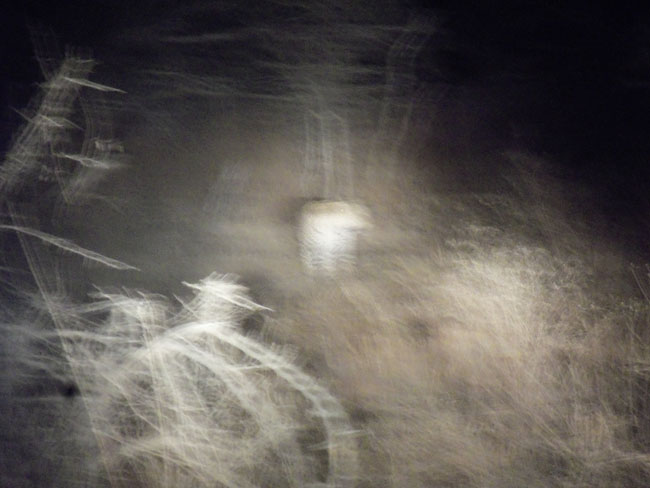 |
| The rhinos didn't like the spotlights. Many of the animals didn't seem to care. On the whole, we didn't shine lights in the animals' eyes to avoid night-blinding them. |
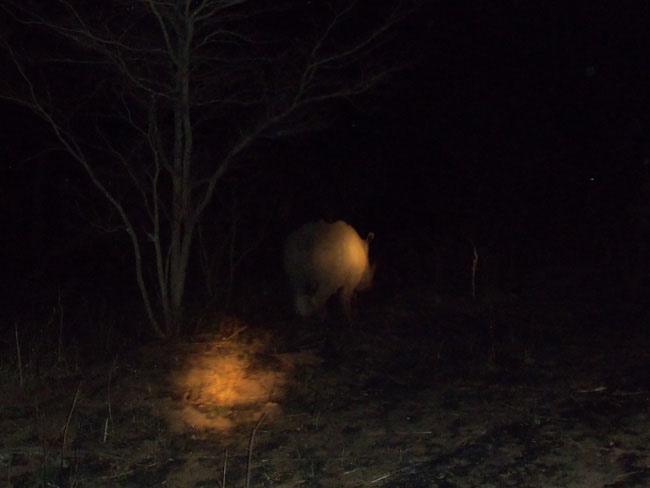 |
| and two more |
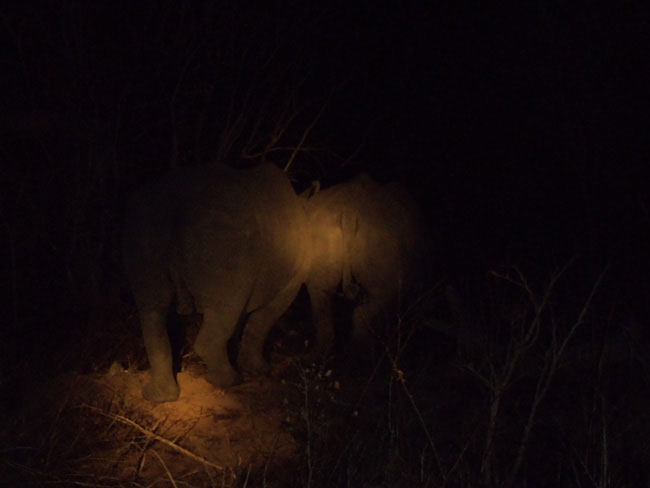 |
| Lekker Camper took care of all the arrangements to get the van to a repair place in Nelspruit that could put in a radiator on a Saturday! It was loaded on a truck, and away we went. The next 2 hours were spent talking with the tow truck driver. Very interesting fellow. |
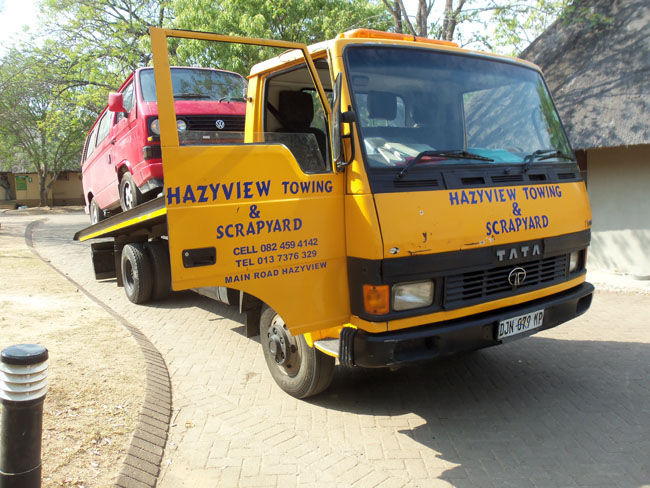 |
| Silverton stayed late to get us running again. |
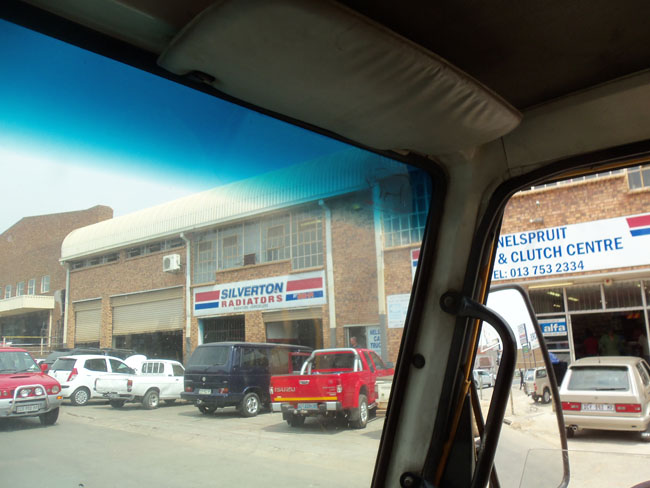 |
With a new radiator, we headed off towards Johannesburg. First we noticed that the speedometer and odometer weren't working. The drive cable had been yanked from its socket during the radiator repair.
We made it as far as Belfast's lake, about half-way to Joburg. We pulled into a fish camp to ask directions to the nearby campground. The puddle on the ground was the result of another part of the cooling system bursting at that moment. The entire system's complement of 15 liters disappeared into the ground very quickly. |
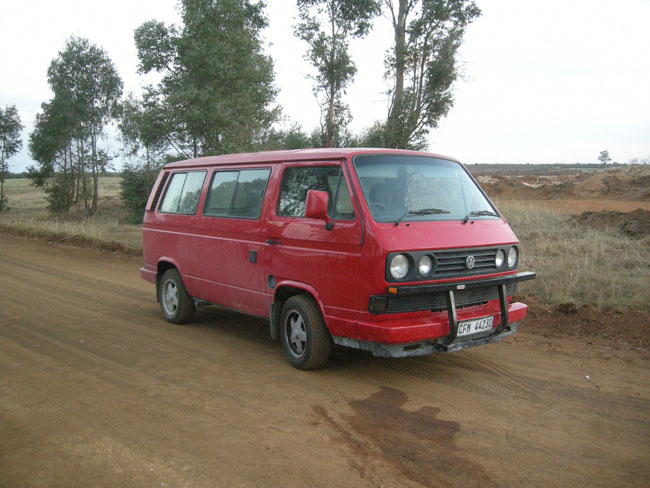 |
| But we were right in front of the private campsite of some very nice people who let us park there. And the site's owner was a mechanic who went home the next morning, got the part and fixed the van on site! |
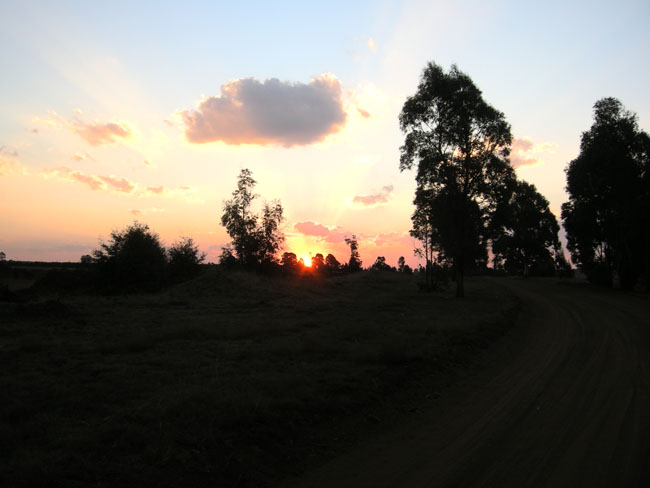 |
| So we made it to the Aero Guest Lodge, a motel within walking distance to the Johannesburg Airport. We arrived by mid-day on Sunday.
We were to fly out on Monday so we decamped and lightly explored the local area. We didn't want to risk another breakdown. |
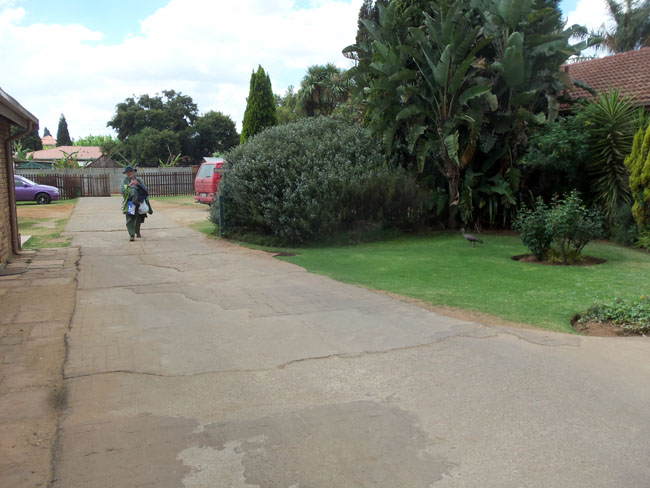 |
| Weaver birds had built nests in the palm tree |
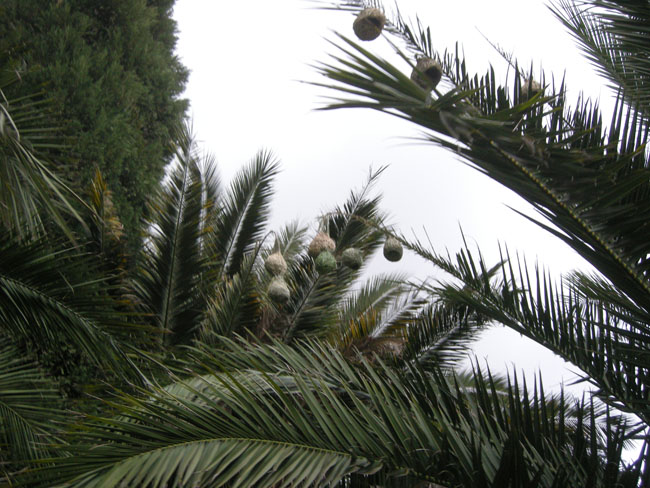 |
| There was some very topical stained glass in one of the Lodge's outdoor seating areas. |
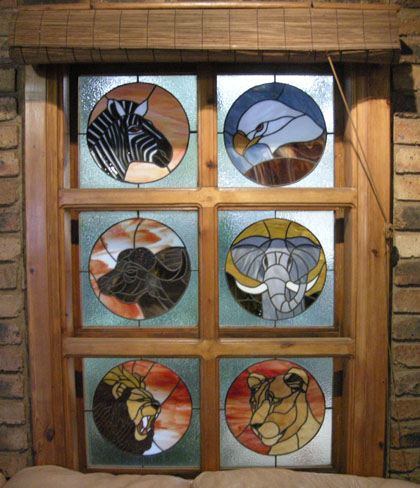 |
| A sudden late afternoon shower became a hail storm. We were able to admire the hail from the warmth of our room. |
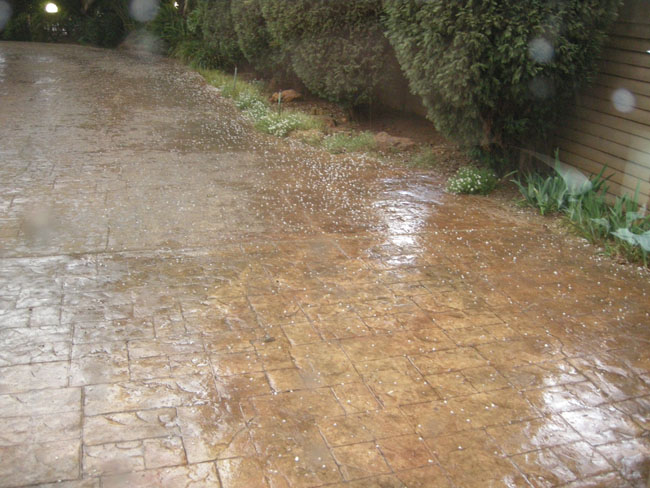 |
| The next day we flew out. It was mostly clear but smokey after take-off |
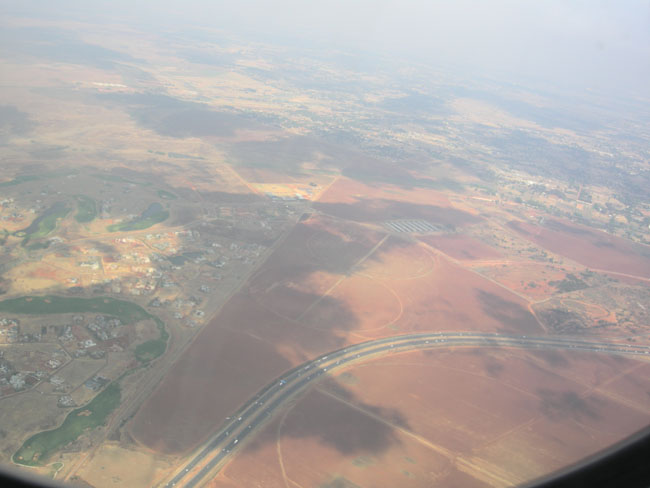 |
| Then these clouds rolled in and the remaining time over the continent didn't provide a glimpse of the ground. |
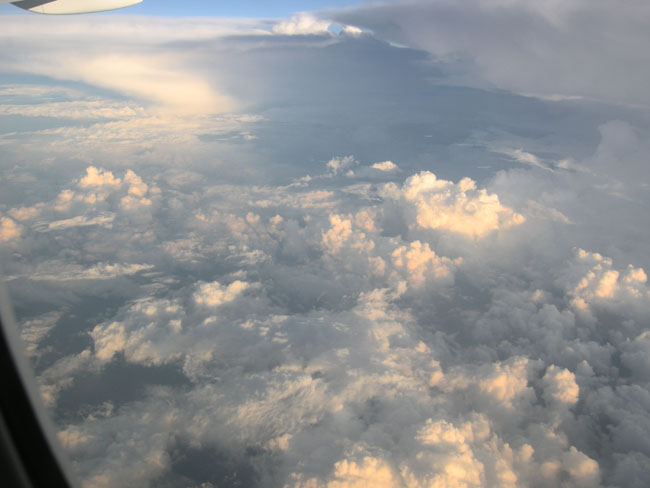 |
| We bounced in Dubai again. |
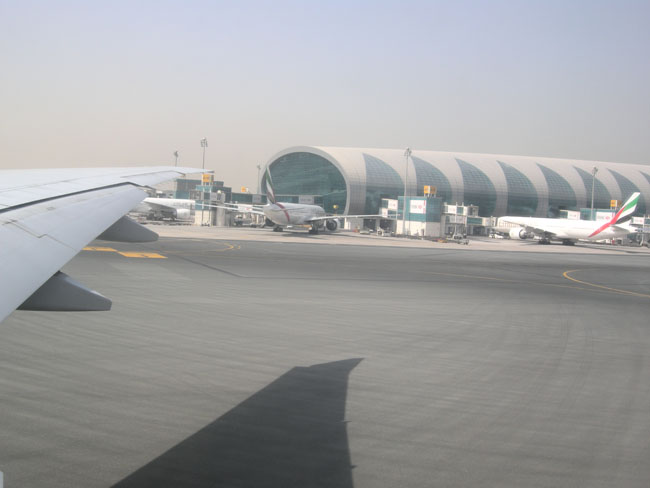 |
| Much to our surprise, we didn't retrace our "over Europe, over Greenland" path. Instead of turning west, we flew northeast... across Russia and out over the Aral Sea. And on northward to the north pole. |
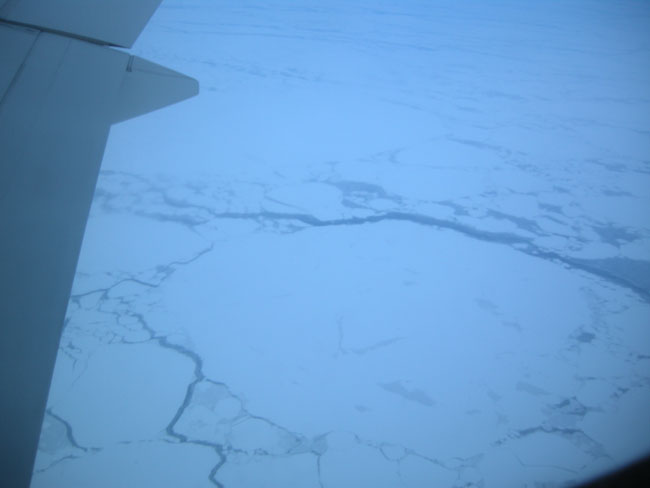 |
The airplane's belly camera gave Dick a view, too.
The sea ice at the pole was broken, but not fully cleared away... yet. |
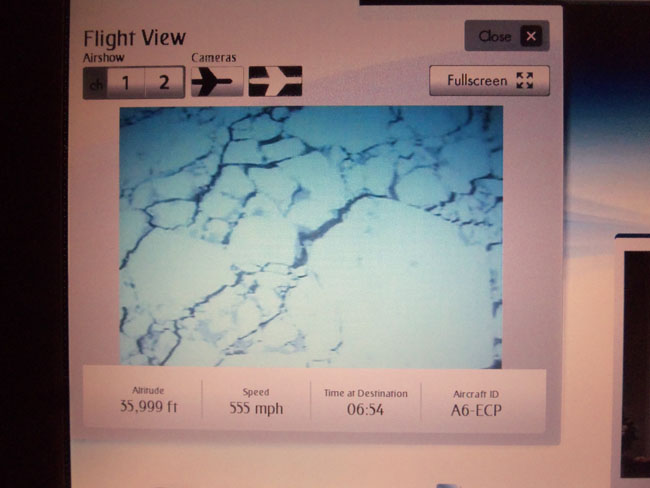 |
If the plane had veered "below" the pole, we would've passed from Oct 1st to Oct 2nd (as "local midnight" went by), and then back to Oct 1st as we crossed the international date line.
By veering "above" the pole, we stayed in Oct 1st for 33 hours. |
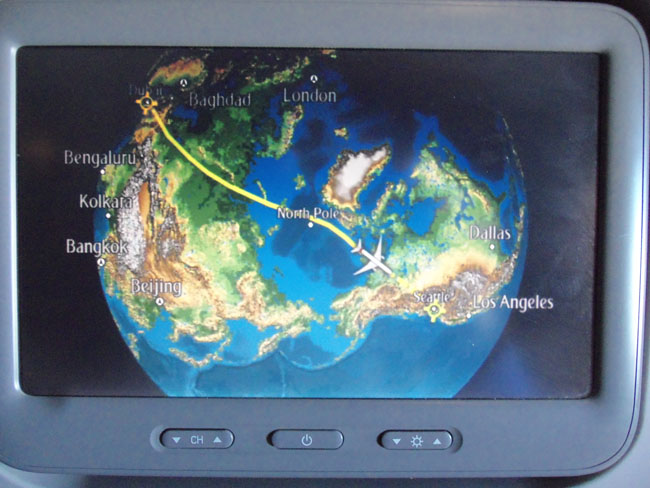 |
| The familiar mountains of British Columbia, Canada, tell us we're almost home. |
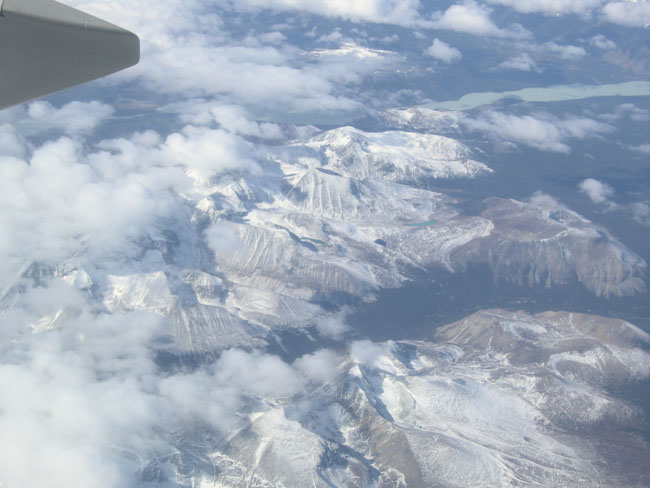 |


























































































































































































